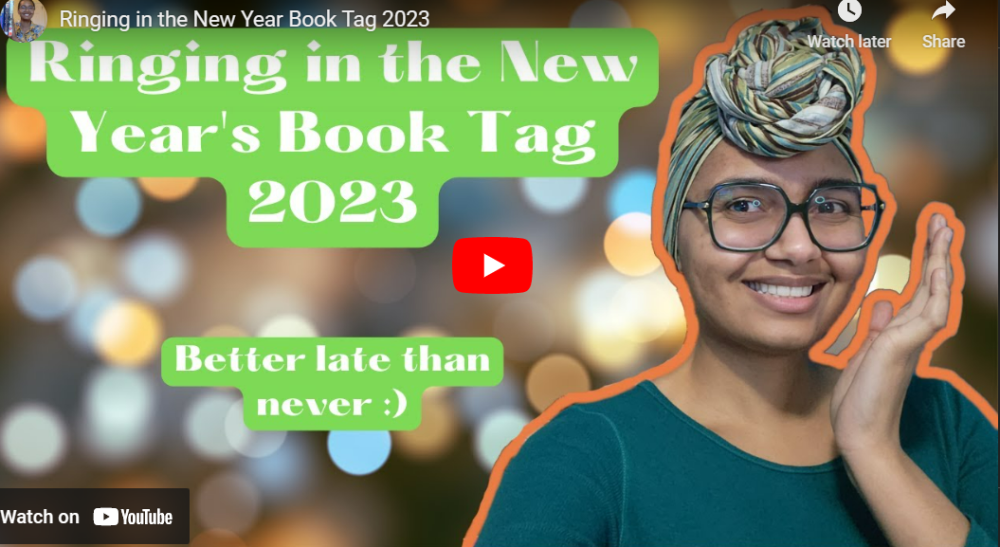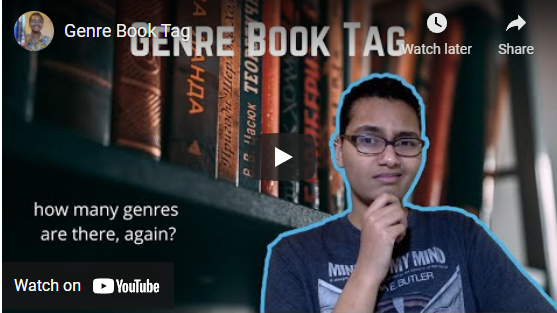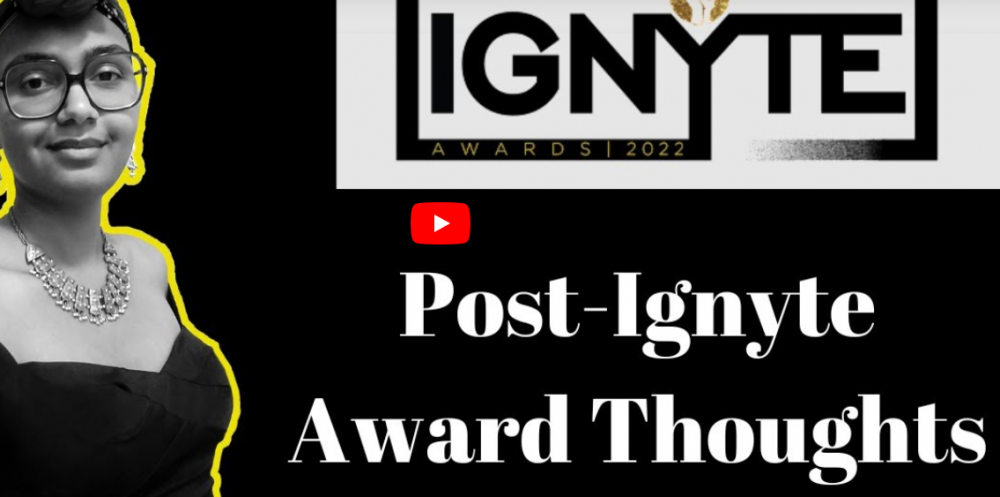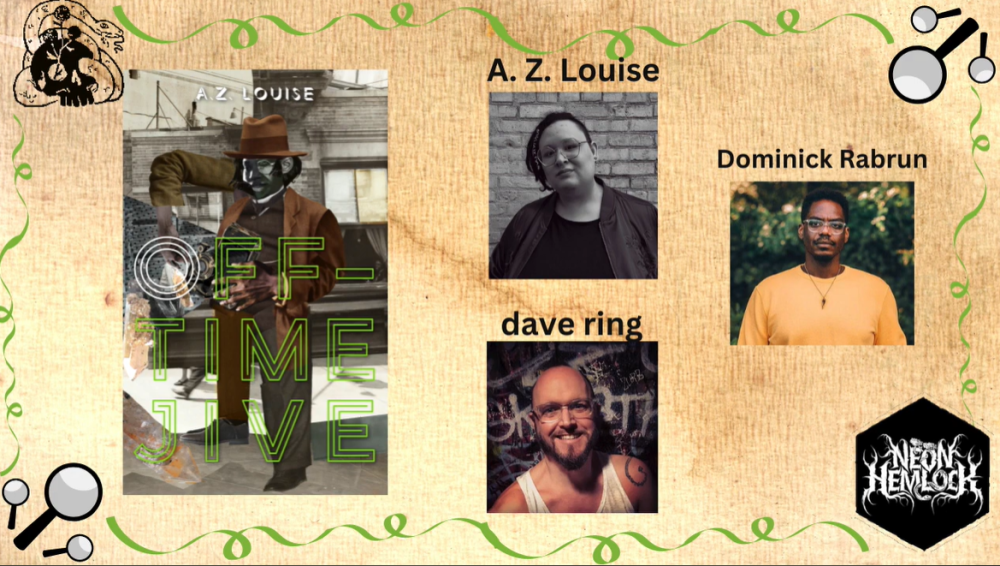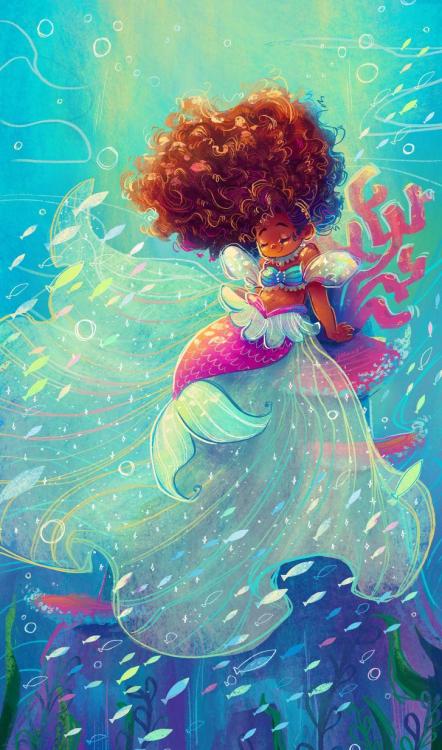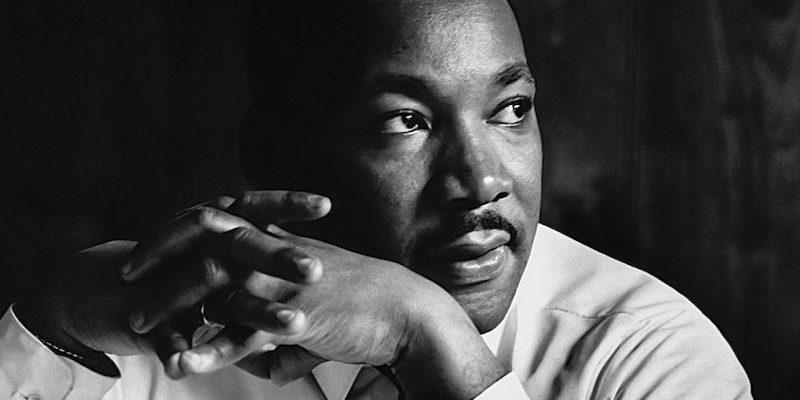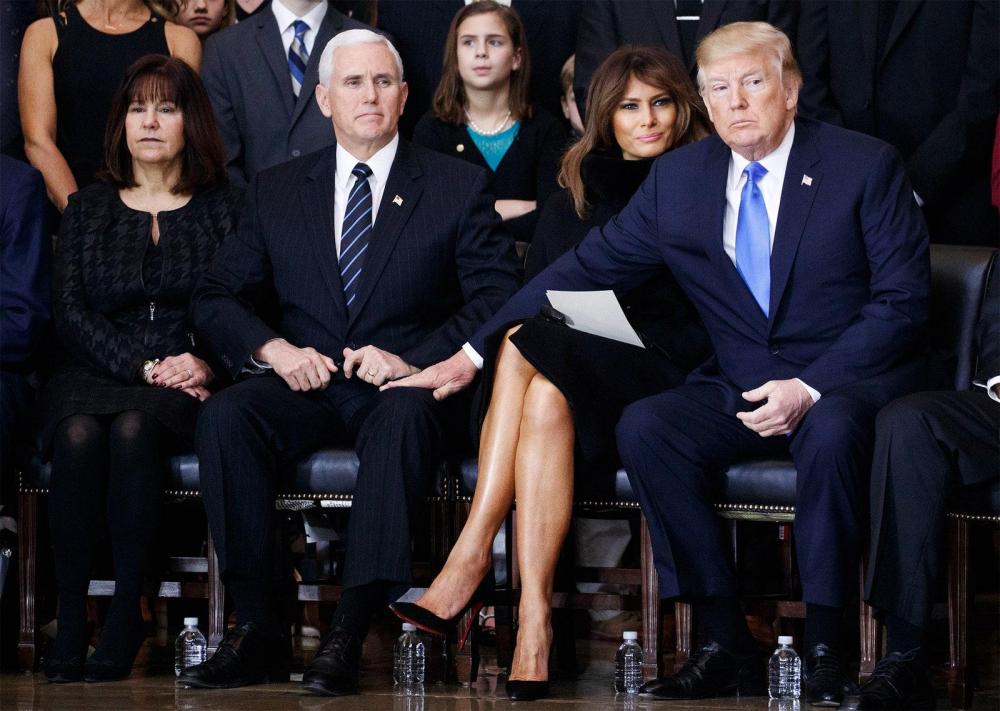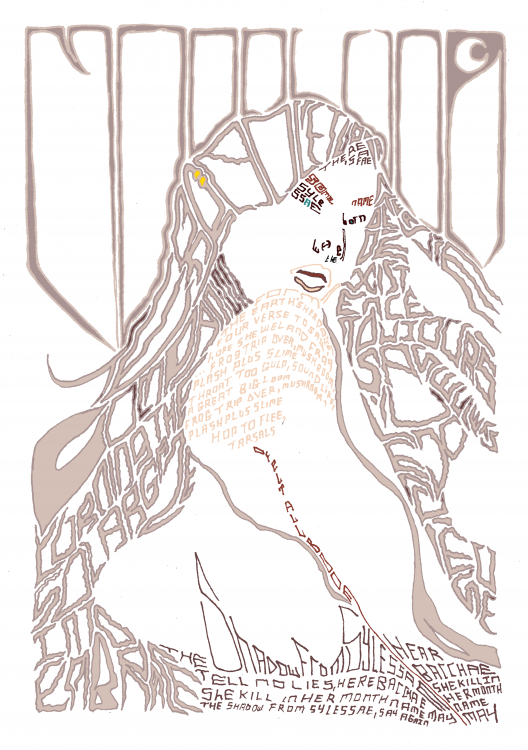Search the Community
Showing results for 'thistle and verse' in status updates.
Found 18 results
-
Thistle and Verse hosting a panel featuring
@Lisa_teabag , @atullerwrites , and @jellybeanrae to discuss subgenres in sff and sff-ish genres that predate the label. Read through the thread for more info on the panelists!
Yvette Lisa Ndlovu is a Zimbabwean sarungano (storyteller). She is the co-founder of the
@voodoonauts
Summer Workshop for Black SFF writers. Her debut short story collection Drinking from Graveyard Wells is currently available for purchase.
https://www.kentuckypress.com/9780813196978/drinking-from-graveyard-wells/A Jersey native, Celestine Martin writes whimsical and flirty paranormal romance that celebrates the beauty of everyday magic. She’s inspired to write happily ever afters and happy for now endings starring the people and places close to her heart.
https://linktr.ee/celestinemartinAbriana Tuller (she/her) is a Vegas native who has just acquired her dream job of becoming a Micro Fiction editor and Fiction co-editor for Solarpunk magazine. Along with having an education background, Abriana is a former journalist.
-
Ringing in the New YEar Book Tag 2023 from Thistle and Verse
mentioned- Ties that bind from Tia Miles
- Darknesses from Lachelle Seville
- Early Departures from Justin A Reynolds
- Delicious Monsters from Liselle Sambury
- Wakanda Forever from Ryan Coogler , Joe Robert Cole
- Heaven Official's Blessing from Mo Xiang Tong Xiu
- Of One Blood: Or, The Hidden Self from Pauline Hopkins
- The Brothers Jetstream: Leviathan from Zig Zag Claybourne
- Forest of a Thousand Daemons: A Hunter's Saga from D.O. Fagunwa , Wole Soyinka (Translation)
- The Things That Fly in the Night from Giselle Liza Anatol
- A History of Nigeria from Toyin Falola
- The Gatekeeper's Staff: An Old Gods Story from Antoine Bandele
- Flowers for the Sea from Zin E. Rocklyn
- The Infinite from Patience Agbabi
- For the Culture Readathon from TyBooks01
- Drunken Dream of the Past from Sun Yujing performed by Lin Zhixuan
my comment
https://www.youtube.com/watch?v=OKreFvghrKk&lc=UgxXtsU2FVBC5yJcoOd4AaABAg
- Show previous comments 2 more
-

did you see thistle and verses book list prior?
-
-
 1
1
-
- Report
-
No. Never been to that website. I'll surf its wave ...
-

it is a video, @Rodney campbell just click read more and the video will unveil for thistle and verse
-
-
 1
1
-
- Report
-
Most THistle and Verse interview
with Kel Coleman
2022 end of year review- her award that she earned and books she has bought for 2023
Classic reviews
Hide and Seeker
Ring SHout
A Song of Wraith and Ruin
The Space Between Worlds
The Famished Road
Queen of the Conquered
Thistle and Verse post in my AALBC
https://aalbc.com/tc/search/?q=thistle and verse&quick=1&type=core_statuses_status
-
Inheritance Trilogy Readalong Announcement [CC]
Thistle & Verse
https://www.youtube.com/watch?v=dCn9MFZ1h1o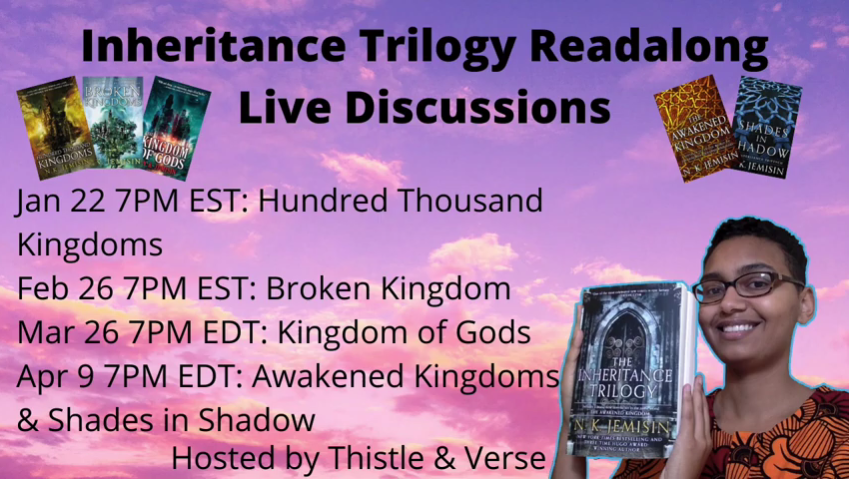
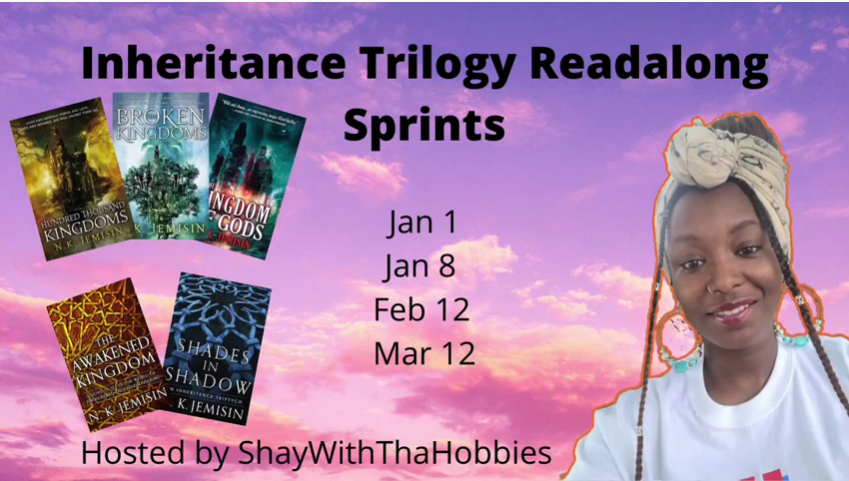
-
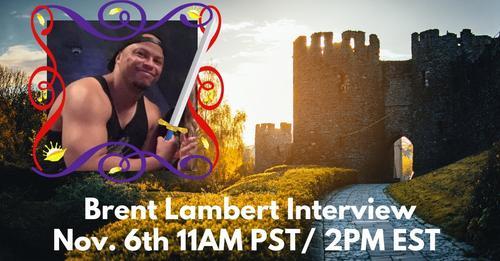
If you're free this Saturday at 2PM EDT, Thistle and Verse will be interviewing Brent Lambert live <Please use the video interview link below!!!> Feel free to watch or stop by with questions. They will be talking about 3 of his fantasy short stories
Blood Song - man with magical abilities makes deal to save his terminally ill boyfriend
Faithful Delirium - zealots ravage land in search of cure for their ailing goddess
Vanity Among Worms - lonely man who's new in town visits a mysterious gay bar
Brent Lambert website: https://www.brentclambert.com/
Video Interview Link - Use it to see
https://www.youtube.com/watch?v=15dOHHMAvZ4 -
Alexis Henderson author of the witching Q&A on Thistle and Verse with Chloe RoseInitial
The ghosts in savannah are mostly wraiths.
2:40
Sequel writing is not for every writer but the financial environment of writers in modernity gears audiences to love getting sequels eternally, ala JAmes Bond or Statian Comic Book characters longevity or Golgo 13 , and industry loves feeding the desire they prompted cause it is easier to gauge profitability or trends than with porviding continuous new stories over a similar time.
4:12
writers at their best always reach their comfortability
5:17
a great question is offered, are the characters in young adult fiction, the main plot characters , age bounded?
I think the modern readership has been manipulated, especially in the usa, to view genres with many bounds on the characters that film them. The Neverending story isn't a children's only book.
7:08
Alexis provides hint to her next work, she says if you like the witching you will like the next work and she is in an anthology
8:05
Imagine a romance with that angel in hell boy golden army as a main character.
9:04
Yes, Chloe , the common reader is disconnected to desiring short stories. The world of telenovelas/movie series pushes the idea that every story must be this modern epic length.
12:27
Interesting, I think many females like Margaret Atwood's no nonsense style , especially in handmaids. Yes, the south has a very agrarian relationship to spiritual.
14:50
Chloe ask Alexis a question never asked before by the writers viewpoint.
17:40
Chloe asks a question I never think to ask, what edit was the toughest, I will steal that question
The structure of each of the witch's and the writers relationship to their genesis or life is good viewing/listening.
23:50
tracy chapman shout
30:38
yes, the bond villain is never alone, sympathy for the devil
I agree, making the financially poorest be the one who must work to improve a larger society is a dysfunction
32:26
She loved Ursula from the little mermaid. Alexis gives her position on witches in media.
33:53
Chloe asked Alexis who will she want to play the characters in film world
Timothée Hal Chalamet
Indya Moore for emmanuel
Nicole kidman then Tracy chapman for vera
37:56
she references her southern baptist upbringing as a potential source to a scene in the book
38:50
brianna collett is the voice actor for the audio book
42:23
an interesting sheparding fact, on jacob rams
we give rams a bad rap like all hoofed creatures cause of the early christian churches criminalization of the more ancient roman culture where the hoofed fauns and hoofed god pan were considered positive entities and thus criminalized the people of the countryside, the villains, who still worshipped greaco roman deities as christianity grew
...
GOOD SHOW
-
Movies That Move We review US 2019
My THoughts
like the montage of reviews
2:10 so many black female writers enjoy PEele's style. I do to but many black female writers tend to start off saying that.
5:40 exactly, I wonder if a 1960s hippie's old plan written on home made paper somewhere wasn't what hands across america stemmed from
7:50 spider grandmother https://en.wikipedia.org/wiki/Spider_Grandmother
11:36 yes, anansi, the story teller, remember anansi has a caribbean version , same name, different stories
13:09 random thought, was the homeless guy taken to a hospital carrying the sign some sort of guard for the doppels/tethers?
Questions how we respond to those who have less than us? What would you do if you came face to face with your darker side?
Your questions are strong. Collective reply as opposed to individual reply. In the film US, the tether abigail answers the question to individual reply by exchanging places. but the originally untethered abigail, replied to her individual revenge with a collective reply, leading all the tethers. and oddly enough, in the end, both abigails got what they wanted, in the end, the collective reply of the originally untethered abigal with hands across america happened with her side her household all killed while the tethered got her replacement life with only her male son, the "mulatto" knowing the truth about her. and her whole household lives. The power of nature here is underrated. I even argue an element of "The man who fell to earth" is used very well in this film's premise. In a man who fell to earth, the government keeps the "alien" man in a base but over time the base is forgotten. How isn't fully explained but whatever happened, the people in government who knew about this or kept it organized died or forgot or moved on, so the installation ran on autopilot, and became decrepit. like the tether's world, its sitting there. Whomever in government was supposed to manage them, stopped or moved on or died or something, where they still get electricity, but their existence is uncared for. And I like that theme of whatever the government was planning couldn't survive nature. But to your first question, to whether people have more or less, whether we want freedom or revenge, we can respond as part of a group or individually. But nature does have influence over things, At the end the tricked abigail was still naive when she was originally tricked and the tethered abigal is still dangerous when she originally forced a switch. Their varying sense of individualism or community didn't change. The tricked abigal, felt the tethered abigail in the first place, she was always communal. the tethered abigail was always an individual, never once interested in helping another tethered escape. So no matter how you respond to another, you will always be yourself eventually.
Well, I will answer, what will I do if I come into contact with one of my infinite other sides? There is a version of me that is more positive than me. and thus, I am the more negative to that version. to answer the question. I don't know. Good question. the engineer in me wants to ask, how did we even meet in the first place. Nature has rules. how are we meeting is my first question, not necessarily how we will get along. But I will say this. The key to coexisting side another interpretation of you, is to be anti christian. I will explain. If you look at zoarasters-ancient kemet-aztec mythology-taoism, most spiritual belief systems accept that nature is not good or bad but all things. But the christian belief system is starkly variant. the christian tradition says god is good, thus that which is not good is not of the essence of life. If you see a version of you doing negative things that you wouldn't do, if you have in your mind the idea that to do negative things is against nature, then you will imply that the other you is unnatural and thus communication problems, coexistence problems.Thistle and Verse
Live Discussion
Kat Blaque
Logan Paul is WRONG about NOPE
Thistle and Verse
Trivia Night
Recommendations Gender Bender
Recommendations Author You've Never Read Before
Recommendations Rocks and Gems
Post-Ignyte Award Thoughts- Doesn't she look pretty
-
MY THOUGHTS
new forms of magic generated by black joy during the harlem renaissance:) The first thing in my mind is, AZLouise has turned magic into a mortal technology, a technology that changes over time. In contrast to how magic is commonly treated. When you look at high john, his magical ability to avoid massah doesn't even have language. High john simply knows it. MAgic is a technology to high john but it is something intrinsic. It isn't new it is ancient. When you think of legends from candomble preist or preisteses, the orisha can take you over today with stellites or drones or cell phones no different than when the whipping post was the center of salvador bahia. Magic is a tool but ti is timeless. Even in harry potter. Hermione's parents are dentist and yet she is mastering ancient spells let wyndgaridum leviosa<bad spelling> which hasn't evolved or changed since first constructrusted. Magic is a tool but it has a primordial essence.
But in AZ Louise's book, without reading it, based on the premise in this video, magic has new forms, magic has new sources of energy. That is an uncommon take. A winter's tale from helprin had a little of what you are doing more robustly. I just got the wishing pool from tananarive due in the mail so I can't ompare the magic in that books tales. but if I recall I will comment back here.nice , good work Thistle , it's kickstarter is already set, by the time I saw this. You will be proud of me, I think I will do a reading series on tumblr live.

The cover is clearly romare bearden inspired:) ala the new negro movement often called the harlem renaissance. With people on the roof of the tenements that is a place I can't recall anyone else writing was the foundry of new magic.
-
Tamara Jeree InterviewMY THOUGHTS
Tamara Jeree told a summation of her story to now
She made this game
https://www.harrytuffs.com/fallen-london#:~:text=Fallen London is a free%2C browser-based%2C literary RPG,Ballad of Johnny Croak%2C and The Icarian Cup).Games is a collaborative effort.
COMMENT IN STREAM: And, the financial reward too Tamara... I am not saying it is impossible, but usually it is better if you have a bigger name to get a financial reward for the work
COMMENT: I don't know if you guys will talk about modern long epic poems? but what do you think of that audience's size?
COMMENT: ahh ok Chloe, I know many different poets, but I don't think the audience is particularly large
COMMENT: And literary games demand dialog, all games demand plot but literary games demand dialog use
COMMENT: Cthulu alert:) I always say that the second a tentacle god thing is mentioned:)
COMMENT: I never tried gender neutrality hmm I don't feel it yet
COMMENT: I think gender neutral is a smart choice for the future for certain audience
COMMENT: that is interesting... that is a poor reader who assumes because of the writer the characters are a certain way ... thanks for sharing the story
COMMENT: Tamara do you have a particular artists you like, check out an artist whose name is GDBee , gdbee has a lovely style in terms of mermaids and aquatic female beings
COMMENT: i wonder what disney will do with that project, i know ariel will be black but i wonder if they are manipulating preproduction /production heavily
COMMENT: Damn creatures of the night:) if i hear about one more vampire story:) I will eat my own gizzard
COMMENT: Tamara or CHloe or other what story you didn't write had your favorite structure of a sea being ?
COMMENT: The gift of THistle and Verse questionaires:) that is a good one
COMMENT: I think one of the issue is reading poetry too, I will never forget a classmates delivery style:)
COMMENT: Tamara did you see, valerien and the city of a thousand planets, and bubble scharacter, in terms of morphing and identity ?
COMMENT: yes for us writers Tamara but I think general audiences can lose interest on poetry based on how it is read
COMMENT Valerian and laureline is a bande dessinee or a comic book, franco /belgium, but a story was made into a film, valerian and the ~ the director of the film made fifth element
COMMENT: I think all of you will like Cyber 6, the argentine/italian comic, the lead character is a cyborg/clone that dresses as male, they made into a cartoon but some big story elements was missing
COMMENT: ode to lithium, lovely title
COMMENT: less loud Tamara:) I will love to see how many people actually yell when they type in UPPER CASE:)
COMMENT: @Thistle & Verse your right, yes, robert burns halloween
COMMENT: la luna, moon poems, ... great memory Chloe, good interviewing
COMMENT: I concur, i start early too:) this year I used nanowrimo to make the content to edit for next year, i am nearly done
COMMENT: Tamara, I admit, the reason was I am drawing more so doing both and it takes time and thus I need to push so I can get sleep ... i am becoming a vampire:)
... i am becoming a vampire:)
COMMENT: take your time Tamara and beyond recommendations, it can be from the work you like to read the most, damn what anybody else thinks, that is not yours
COMMENT: Do you think long titles are wise for anthologies, thanks for the photo chloe
COMMENT: and what determines horror is not the sameSoft science by frannie choi
Odes to lithium from shira erlichman
Julian K Jarboe's Everyone on the Moon Is Essential PersonnelVIDEO NOTES
Tamara Jeree's socials
website: https://www.tamarajeree.com/
twitter: https://twitter.com/TamaraJereeRecent works/ preorderlinks
Unfettered Hexes: https://www.kickstarter.com/projects/fngs-fr-th-mmrs/carpe-noctem-vampires-through-the-agesLink
https://www.youtube.com/watch?v=B7MA9YGyyfQ
-
What's in a Genre: Black Authors and SFF
MY THOUGHTS
1:35 the theme of the talk is how genre placement influences a work's reception/advertisement/readership connection
5:36 CHloe asks, what is the purpose of genre, how do you define, and relate to genre from each of the panelists perspectives
7:18 Njeri said growing up and before, she never focused on genre, she followed authors or work of a certain way but now , especially in the past few years, she notes the genre. Her work as a reviewer focused her mentality. She worries about the elitism around genre. She feels story or purpose is stronger.
She is right, artistic debate can be very chaotic and genre can be a tool for some to limit how a work can be interpreted.
10:04 Oghenechovwe said Genre is meant for organization... I concur , the number of books in human history demand categorization.
He said its strength is its flaw. It categorizes but it also leads to the possibility of assumed expectation from readers or structural rigidity from writers
14:28 Jherane, she spoke as a reader, who doesn't write, so she wants to have some expectations. Readers can be upset when they don't get what they expect.
I concur, the readers or the money, influence the financial ability of a work based on their expectations
She admits the caribbean reading community the readership isn't forced into genres but more to themes, as she finds in many non usa or european reading groups.
19:35 Alex states as a librarian or review genre matters a lot. For her genre doesn't have firm borders. But librarians need genre's and this dictates management in the library bookselling environment.
I think geographic notations needed to be added into the genre list. What is Statian Science Fiction/What is Chinese Science fiction /What is South African Science Fiction... et cetera
23:37 Oghenechovwe I concur to his historical point, the usage of genre has been more a tool to dictate what readers should expect. ala why Daughters of the Dust is still for many a period piece, and not a science fiction or fantasy film
He makes a great point, how people view knowledge, or science , dictates how they view the fictional interpretation of science or knowledge
27:29 Njeri supports Oghenechovwe well, the categories are too blunt, or are definitely less flexible or rigid. And, the readership is the money, and to make your work financially successful you need the readership to feel comfort, but that comfortability is functionally a negative bias
31:22 good points on Freshwater by Chloe
32:19 Jherene explains how magic is perceived in the caribbean where Jherene lives
I wonder what the panel will think on Genre's being replaced by Themes instead as a main category in the selling of work, not in libraries
38:56 Njeri talks about how what horrifies her is not always in horror and Chloe continued with a perspective from a poet in how she looked for books not listed as horror for the horror anthology she curated
40:42 Chloe asks the panel, where do you want genre to go
Oghenechovwe talks about the need for greater expanse in the future, Jherene relates it to genre's in music that come and go need to be mirrored in literature, Alex talks about more voices and the need for gatekeepers are getting fewer and fewer and controller and controller but the readership has to expand out and maintain looking beyond what the industrial owners demand, Njeri focuses on lifting up and centering on certain work , to be definitive of where to read,
Oghenechovwe says focus to the literature is focused on above the academic discussion about a literature
Ben Okri, flagship novel, the famished road
Unraveling from KAren Lord
daylight come by diana mcauley
VIDEO NOTESThistle & Verse
Panelists' websites
Oghenechovwe Donald Ekpeki: https://odekpeki.com/
Onyx Pages: https://www.youtube.com/channel/UC_reNHCI5mUeKGbvkN2_bTA
Alex Brown: https://bookjockeyalex.com/author/bookjockeyalex/
Jherane Patmore of Rebel Women Lit: https://www.rebelwomenlit.com/A big thanks to Britt Writerly ( https://www.youtube.com/c/BrittWriterly) for helping me come up with this panel.
LINK
https://www.youtube.com/watch?v=xIJYg_o9wXY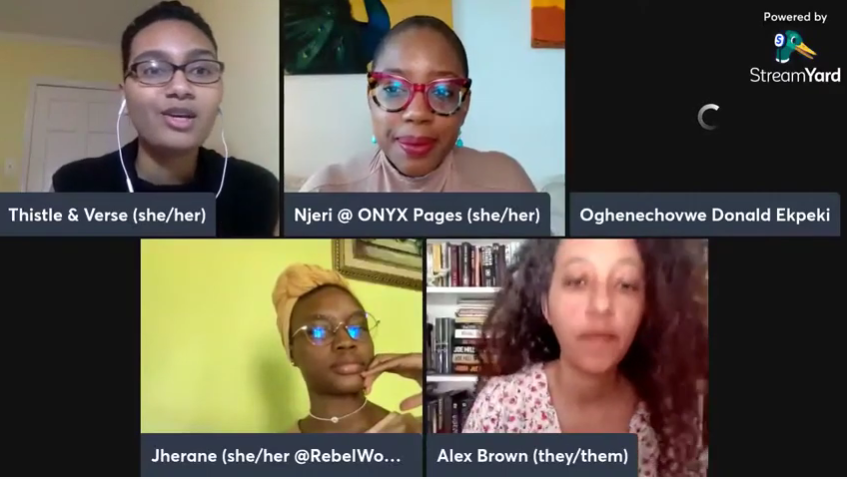
-
An interview between Brent Lambert, an initiator of Fiyah magazine aside Chloe in Thistle and Verse
MY THOUGHTS
I wasn't a big fan of the xmen, loved storm:)
every gay man has his english teacher:) that is a good one
THistle is a funny interviewer, she never allows interviewee's to look down on themselves
It isn't hyperbole, lambert is right to say, every story has a piece of one's soul, unlike him I think the issue isn't the quantity but the part of one's soul. Is it one's hope or one's wickednes or other?
I concur to his point about social media usage. Too few artists spend time supporting other artists while more time saying what leads to clicks or likes.
Interesting, he keeps track of what he reads on a spreadsheet. Nice detail
Him and Chloe love their worlds:)
Lambert spoke a simple truth, one many artists have opined, no work of art is ever perfect, meaning a complete work.
I am glad circa 34:31 lambert said that characters were easy to write who were inflexible, I will not say one dimensional , all humans beings have the same dimensionality.
He said it wasn't hard on a craft level, but a personal level.
But, are readers right for not wanting, protagonists who are not flexible or fluir? or writers poorly using the craft, when they don't write flexible, culturally open characters.Lambert made clear something I always say, write what you know:) write from your soul? more better, create from your soul
Thank you lambert for saying that, the industry pushes sympathy.
circa 50:36 thank you Lambert for saying you don't need to write to be published, the financial capitalistic mentality to art is incorrect, you need to make money but create
Chloe asked a great question, what question Lambert want asked that isn't?
Lambert's question he want is: how will his work be remembered.He adds, a time will come where your skill will not be equal to vision
His next project, I paraphrase him: mr and mrs smith with gayness and blackness:) enjoy:)VIDEO LINK
https://www.youtube.com/watch?v=15dOHHMAvZ4FIYAH MAGAZINE
https://www.fiyahlitmag.com/shop/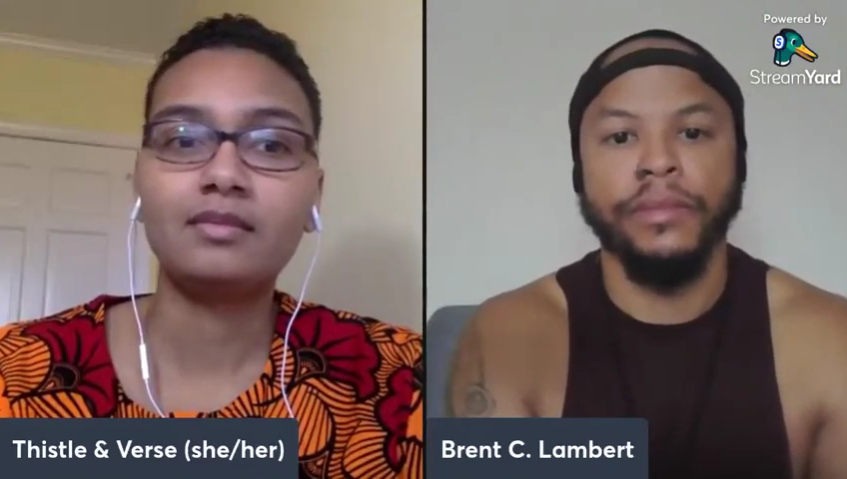
-
The Library of Congress will no longer use “aliens” and “illegal aliens” as categories.
Original article by By Walker Caplan
November 15, 2021, 2:20pmAt a regular meeting of their Policy and Standards Division, the Library of Congress confirmed it will replace the cataloging subject headings “Aliens” and “Illegal aliens” with the terms “Noncitizens” and “Illegal immigration.”
This decision comes after a long conflict between advocacy groups of the changes and elected officials representing populaces that didn't want the change. In 2014, students and librarians at Dartmouth, submitted a formal request to the Library of Congress for the “Illegal aliens” catalog heading to be revised to “Undocumented immigrants.” The Library of Congress announced that they would not change the heading; subsequently other librarians, including the American Library Association, continued to petition the Library of Congress to revise the heading.
The Library of Congress agreed to replace the subject headings in 2016—but a group of elected officials in Congress following their voting populace, added a provision to an appropriations bill that required the library to keep the “Aliens” and “Illegal aliens” headings.
"as expeditiously as possible. ...This update better reflects common terminology and respects library users and library workers from all backgrounds,” said ALA president Patty Wong in a statement responding to the change. “It also reflects the core value of social justice for ALA members, who have been at the vanguard of this change for years.”
MY THOUGHTS
I think patty wong is incorrect at a level. She says the terms: noncitizen or illegal immigrant are in line with common terminology but that is not true. If you go through legal papers from the states or the federal government it is clear, the most common terms historically are "aliens" or "illegal aliens". I am not suggesting they are sensitive terms, or unthreatening terms, but they are the common terms. In the same way colored or negro or blacks were the common terms for the often called african or afro american or black american in modern usa. She also is wrong. No terms respects all people. The people who didn't want the term changed are not being upheld by this terminology change. One of the great flaws in modernity, meaning the now, is the idea that a certain is better for all people even when it clearly is against the wishes of a segment of all people. And, utilizing another term isn't a negative or positive, but, when we lie and suggest it is common instead of radical, it is a dysfunctional act in the goal for better discourse.
ARTICLE LINK
https://lithub.com/the-library-of-congress-will-no-longer-use-aliens-and-illegal-aliens-as-categories/Nobel winner Orhan Pamuk is under investigation for insulting modern Turkey’s founder—in a novel.
Original article By Walker Caplan
November 16, 2021, 12:48pm
Turkish novelist Orhan Pamuk is being investigated by the government of Turkey.Earlier this year, Pamuk was investigated on criminal charges of insulting the Turkish flag and Mustafa Kemal Atatürk, the founder of modern Turkey, in his latest book. Nights of Plague, a historical novel about a plague epidemic on a fictional Ottoman island, features a character—Major Kamil—who was read by the prosecutor as a parody of Atatürk. Pamuk and his publishing house denied the allegations, and the case ended in non-prosecution due to lack of evidence.
But the lawyer who made the initial complaint—Tarcan Ülük—appealed the case, and now, the investigation has been reopened. If Pamuk is found guilty under Law 1816 of the Turkish Penal Code, he could receive a sentence of up to three years in prison.
In 2005, Pamuk had to go to court after he told a Swiss newspaper that around one million Armenians were killed on Turkish territory in the early twentieth century. In 2020, the Turkish government jailed at least 25 writers and public intellectuals for their writings—the third-highest number of writers and public intellectuals jailed globally by one country that year.
“Pamuk’s writing has had a profound impact on the literary world, yet his reputation for having courageous and uncompromising politics has made him a target of the Turkish government’s ongoing and systematic effort to silence dissident voices,” said Karin Deutsch Karlekar, director of free expression at risk programs at PEN America, in a statement. “[The reopening of the investigation] points to the overall climate of repression against writers in Turkey and demonstrates how the legal system enables appalling authoritarian restrictions on free expression and creativity.”
MY THOUGHTS
Artist's are all alike in at least one way, where they live may or may not be comfortable to what they create. But, a question arises. Is Pamuk Turkish? Now many will say, of course, he is. But I argue, like many who were raised in schools that mirror the culture of the white western european christian community, he has a mental rearing that reflects a non turkish culture and there lies the problem. The culture of the majority where an artists live need not be the culture of the artists, but the artists judgements of that larger culture warrant reprimand. When sojourner truth wrote about the essence of freedom, was she writing something indicative to the white majority of the time? no. Does this mean I oppose her writings? no. But I comprehend the risks any artists take when they have a stance that many in their geographic proximity oppose. And if you take the risks then you have to be ready to handle a potential burning. The USA loves to use the imperial demand through filtered reconnaissance, in this case pen america, and it is sickening. Turkey is not the usa, legally. And, Pamuk knows this. Is he writing with respect to Turkish law, or not? Should turkish law reflect the legal code of the usa? I say no.
ARTICLE LINK
https://lithub.com/nobel-winner-orhan-pamuk-is-under-investigation-for-insulting-modern-turkeys-founder-in-a-novel/THE BLOOMINGDALE STORY: READ THE NEVER-BEFORE PUBLISHED PATRICIA HIGHSMITH DRAFT THAT WOULD BECOME CAROL (THE PRICE OF SALT)
A rare gem from Highsmith's newly released diaries and notebooks, with annotations from the author and her editor.
NOVEMBER 16, 2021 BY PATRICIA HIGHSMITH
VIA LIVERIGHT PUBLISHINGThis draft of “The Bloomingdale Story” was written by Patricia Highsmith in 1948. It would later be expanded and significantly reworked before being published as the novel The Price of Salt, later titled Carol. The draft is included in the newly released book, Patricia Highsmith: Her Diaries and Notebooks, 1941 – 1995, published by Liveright Publishing, which has made it available here. Notes presented in the right margin were made by Highsmith upon revisiting her notebooks at a later date, accompanied by explanatory notes from her longtime editor, Anna von Planta.
READ THE COMPLETE DRAFT IN THE ARTICLE LINK
ARTICLE LINK
https://crimereads.com/patricia-highsmith-bloomingdale-story-draft-carol-price-of-salt/
Fragment of lost 12th-century epic poem found in another book’s binding
Scholars knew the work about Guillaume d’Orange and the bloody siege of his city existed, but until now believed it had been lost completelyAlison Flood
Thu 18 Nov 2021 07.32 EST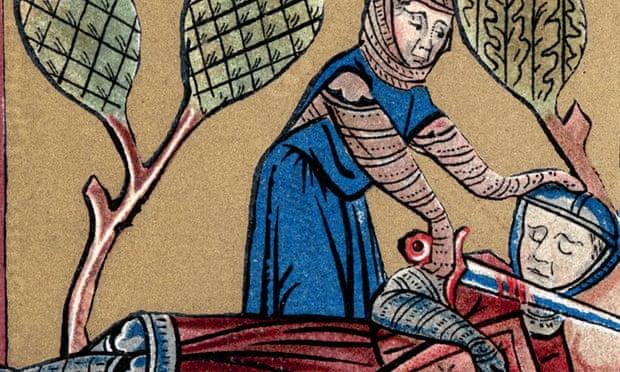
Guillaume kills a giant in an illumination from 13th and 14th century manuscripts of the 'Chanson de Guillaume d'Orange.' Photograph: Granger Historical Picture Archive/AlamyA fragment from a 12th-century French poem previously believed to have been lost forever has been found by an academic in Oxford’s Bodleian Library.
Dr Tamara Atkin from Queen Mary University of London was researching the reuse of books during the 16th century when she came across the fragment from the hitherto lost Siège d’Orange in the binding of a book published in 1528. Parchment and paper were expensive at the time, and unwanted manuscripts and books were frequently recycled.
Scholars had believed the poem, which comes from a cycle of chansons de geste – epic narrative poems – about Guillaume d’Orange, existed, but there had previously been no physical evidence that this was true. The fragment only runs to 47 lines, but it proves the existence of a poem thought to have been completely lost.
The poem is set in the ninth century, during the reign of Louis the Pious, Charlemagne’s son and heir. Atkin said that while it is believed to have been composed in the late 12th century, the fragment itself is from a copy made in England in the late 13th century.
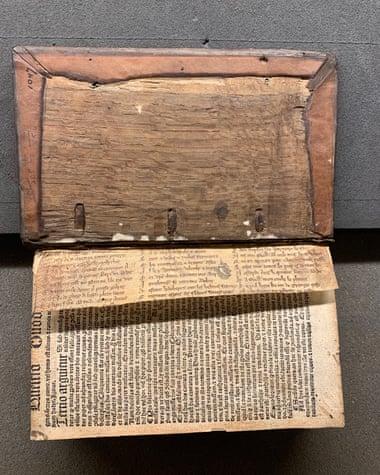
A fragment from the Siege d’Orange. Photograph: Tamara Atkin/Bodleian Libraries“Il li demande coment se contient il? / Mauuoisement li quiens Bertram ad dit / Tun frere n’ad ne pain ne ble ne vin / Garison nule dont il puisse garir / Mais ke de sang li lessai plein Bacin,” runs an early section of the fragment, which Philip Bennett, an expert on Guillaume d’Orange from the University of Edinburgh, has translated as: “He asks him, ‘How goes it with him?’ / ‘Badly,’ said Count Bertram. / ‘Your brother has neither bread nor corn nor wine; / He has no supplies with which to save himself, / Except for one basinful of blood, which I left him.’”
The quoted lines come as Bertram begs the king for help relieving the siege of Orange, a city in the Rhône Valley, describing the dire siege conditions. “In later parts of the fragment we hear him berating the queen (at one point he even calls her ‘pute russe’ or ‘red-headed whore’), who has objected to her husband leading a relieving army south,” said Atkin.
Atkin also found a parchment fragment from Béroul’s Roman de Tristan, telling part of the story of Tristan and Iseult, in the same book. The 12th-century poem is one of the earliest versions of the medieval romance, and until now the only evidence of its existence had been an incomplete 13th-century manuscript in the Bibliothèque Nationale de France. The fragment found by Atkin differs “significantly” from the manuscript, and shows the poem was circulated more widely than had previously been thought.
“When you find manuscript waste in a 16th-century book, it tends to be in Latin, and it’s almost always something theological or philosophical, and from the point of view of modern-day literary scholarship, perhaps not that interesting. But the fragments in this book were different,” said Atkin. “They were in French, they were in verse, and in one of the fragments the name Iseult immediately jumped out. I’m not a French scholar, and I realised I was going to need to bring in some collaborators. From there, it’s just been really fun and exciting.”
She approached academics from the universities of Bristol, Edinburgh and British Columbia to help. “I knew it was something important,” said JR Mattison, a French-manuscript specialist from the University of British Columbia who helped to identify the Tristan and Iseult fragment. “This piece of the poem comes from a significant moment when Iseult speaks with her husband King Mark. This fragment expands our knowledge of the poem’s audiences and its changing meaning over time and contributes a new perspective on how Tristan legends moved across Europe.”
Bennett said there had been “no physical trace” of the Siège d’Orange poem before. “There is much evidence from other chansons de geste that a poem about the siege Guillaume d’Orange suffered in his newly conquered city must have once existed,” he said. “The discovery of the fragment we now have fills an important gap in the poetic biography of the epic hero. This is a most exciting addition to the corpus of medieval French epic poetry.”
The team will now work to discover more about when and where the fragments were copied, and how they came to be bound in the 1528 book. “That manuscripts were made at all reflects the value once placed on the texts they contain. But manuscripts that were dismembered and reused as waste were no longer valued as texts. Their only value was as a material commodity – parchment – that could be used to reinforce the binding of another book. The manuscripts containing these French poems were probably recycled because the texts were considered old-fashioned and the language outdated,” said Atkin.
“It’s fantastically exciting to discover something that’s been lost all this time, but I do think it is also worth simultaneously holding the thought that actually, the only reason these fragments have survived is because at some point, someone thought the manuscripts in which they appeared were not valuable as anything other than waste. There’s a sort of lovely tension in that, I think.”
ARTICLE LINK
https://www.theguardian.com/books/2021/nov/18/fragment-of-lost-12th-century-epic-poem-found-in-another-books-binding
WHY SHOULD CHILDREN READ DARK BOOKS?
Katie Moench Nov 12, 2021Scary books made to give readers the chills may not be the first thing that comes to mind when thinking of “children’s literature.” Horror, whether it be books, shows, or movies, is often thought of as a more adult genre, especially when it depicts violent situations of terrifying outcomes. Death, dismemberment, and masked men with sharp, stabbing knives aren’t exactly the stuff of bedtime stories, and no parent could be blamed for wondering if their kid will never sleep again after reading ghost stories. But even though darker subject material may not be the most common type of children’s book, it can play an important role in the emotional development of young readers.
When children encounter new situations in books, whether scary or not, it gives them a chance to think through how they would handle such things, as well as experience new emotions from a safe and hypothetical place. As children’s author Cavan Scott puts it in his workshops on juvenile horror, “the world is a scary place.” By giving children scary books, Scott argues, young readers can be “pushed to the edge of their comfort zone,” but still get a resolution at the end. Since books for younger readers tend to end at least somewhat happily, children get the experience of being scared, but aren’t necessarily exposed to the more ambiguous endings dark books for adults might contain. If kids are not allowed to read anything frightening or shocking, then they won’t be able to develop the coping skills they’ll need when scary situations arise in their lives.
In addition to allowing children to develop skills for navigating difficult situations, scary stories can also warn young readers about dangerous situations. Even now, I can still remember moments where my favorite charcters in childhood books were put in danger, and how they reacted. Though it’s not healthy to be fearful all the time, books can impart important lessons, from the dangers of getting too close to wild animals to the need to be cautious around strangers. Kids can also think about, and discuss with the adults in their lives,how to stay safe and what kinds of choices they would make in such situations.
And, of course, dark reads can appeal to young readers simply because kids, like adults, like them. Children, in my experience, are their own best judges when it comes to what they find interesting to read and how difficult of stories they can handle. Many otherwise reluctant readers might love the Goosebumps or Tales from Lovecraft Middle School series, precisely because they are full of exciting and nerve racking characters and events, and reading these kinds of books can set children up as lifelong lovers of horror. When kids find books that engage them and that they enjoy, they are more likely to view themselves as readers and to feel like they have a place in the world of books.
No matter how much we might wish otherwise, children, like all humans, experience fear. We are programmed to fear new experiences and unknown things, and even if worries about monsters under the bed or shadows lurking in the dark might seem silly to grown-ups, to children they are very real dangers. Additionally, situations like starting at a new school, dealing with a divorce or death in a family, or moving to a new house can all bring up feelings of anxiety or even dread for kids learning to work through the emotions surrounding such events.
Whatever our age, books, and stories give us the opportunity to process situations outside of ourselves and to draw inspiration and comfort from how others have coped with similar, scary situations. While an adult might not immediately see the connection between being the new kid at school and a book about a kid who hunts ghosts, for a young reader, it’s an opportunity to see someone their age being brave. Just as the best horror novels play on our realistic fears, dark reads for kids can help them emotionally explore frightening situations through the safety of a book. Plus, kids might find they really connect with darker reads, and it can help set them on the path to being engaged and lifelong readers! If you’re looking for dark reads for the kids in your life, hand them some of the books below.
USE THE ARTICLE LINK BELOW TO VIEW THE ENTRIES SUGGESTED
ARTICLE LINK
https://bookriot.com/why-should-children-read-dark-books/REFERRAL LINK
https://kobowritinglife.com/2021/11/19/book-bans-the-national-book-awards-and-a-lost-poem-fragment-this-week-in-book-news/
-
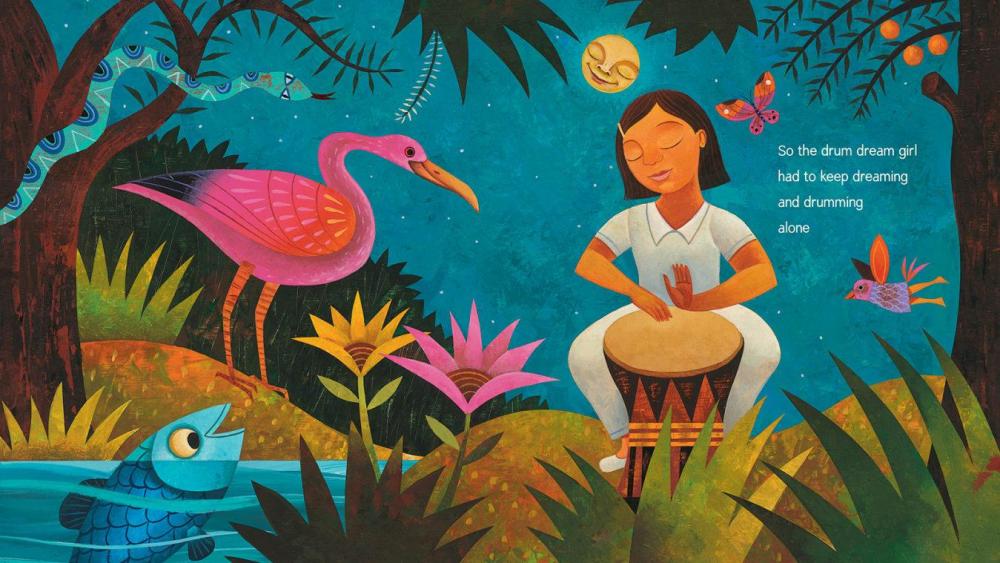
Afro Latinx children's books are still too rare. These four authors are trying to change that
Written by
CNN Style StaffA vivid homage to the graffitied streets of the Boogie Down Bronx and an interstellar quest for the perfect natural hair style are part of a new wave of picture books celebrating Afro Latinx culture and characters, in an industry where these stories are still few and far between.
"I want to show kids of diverse backgrounds that they can go on fantastical adventures, too," said New York-based illustrator and toy designer Yesenia Moises, author of "Stella's Stellar Hair." She noted that in children's media, stories featuring protagonists of color are often about overcoming struggle, or are "hyper-focused" on identity and race. "I want to step away from that for a moment to be able to show that ... their worlds can be vibrant and full of color."
Having grown up without picture books that reflected their own experiences, the Latinx authors and illustrators featured below are crafting and sharing those stories themselves, with colorful vivid imagery, prose and verse.Here, four authors speak about their storytelling philosophies, and why kids need to see themselves in the pages of the stories they read.
Eric Velasquez
Eric Velasquez is an Afro Puerto Rican illustrator, author and educator. He has illustrated more than 30 books and has authored four, including "Octopus Stew," about a boy named Ramsey who must save his grandmother from the gargantuan octopus she's cooking.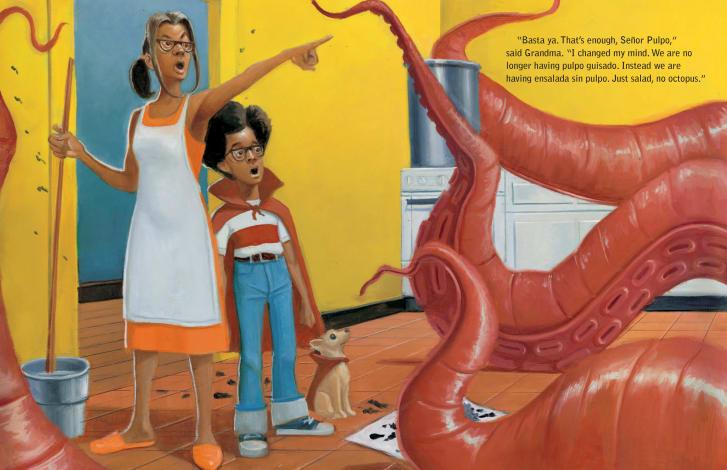
"Octopus Stew" was inspired by the tall tales of Velasquez's father. Credit: Eric Velasquez/Courtesy of Holiday House Publishing
My family comes from a strong oral storytelling tradition; we would gather together to share and listen after nights of dinner and music, and so it was something that I wanted to be part of.
My book "Octopus Stew'' is essentially a tribute to that oral tradition. Whenever my dad would come over and cook for my friends and me, he would inevitably say, "Did Eric tell you about the day I rescued him and his grandma from the giant octopus?" Every single one of my friends knows that story because of him, and over the years, it just grew like a tall tale.
Grandmothers are central to many of my stories. I can trace my own career back to the summers I spent sketching in my grandmother's living room in Spanish Harlem, surrounded by music.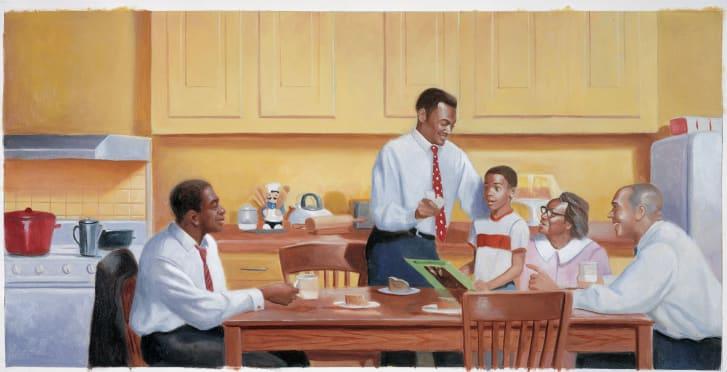
In "Grandma's Records," Velasquez recalls the memories from his own childhood that made him understand that 'heroes' aren't just White. Credit: Eric Velasquez/Bloomsbury Children's Books
Those summers inspired my book "Grandma's Records," and also taught me the importance of having heroes who look like us. I remember marveling at the musicians who would visit when I was young, including Rafael Cortijo, the prime architect of Puerto Rican salsa. When he came by, my grandmother told me only to refer to him as "maestro."
"That man is a genius," she said, "and he deserves to be treated with respect."
In school, when we learned that Beethoven was a musical genius, I remember thinking, "I know a genius too! He loves rice with beans and roast pork, and he even entertains us with music after dinner." I didn't feel there was a disconnect between the concept of "genius" and what I saw around me.
But over time, I realized other kids struggled to do the same; at art school, when they pictured "heroes" they would never draw men or women of color.
That's when I started to realize how important representation is. When you grow up with examples of diverse heroes, it affects your imagination. You start to believe that you can be part of this creative world, and I think that's very important.
Yesenia Moises
Yesenia Moises is an Afro Dominican toy designer and illustrator. She is the author of "Stella's Stellar Hair," a book about a young Black girl with natural hair who travels the solar system in search of hairstyles."Stella's Stella Hair" is about owning your natural hair, inspired by Moises' own hair journey. Credit: Yesenia Moises
When it comes to my hair, I spent most of my life trying to fit the mold of Eurocentric beauty standards by chemically relaxing my hair. Growing up, my mom, a fair-skinned Latina woman with the loose waves a lot of people aim for -- not at all like mine -- would always comment on how thick or unruly it is, or how it tangles itself.
It was only after I started letting my hair grow out in its full, natural glory that I grew to love it, but even then I realized that many kids today are still made to feel bad about their hair. So I created "Stella's Stellar Hair" to celebrate the variety and creativity of Black hair across the African diaspora.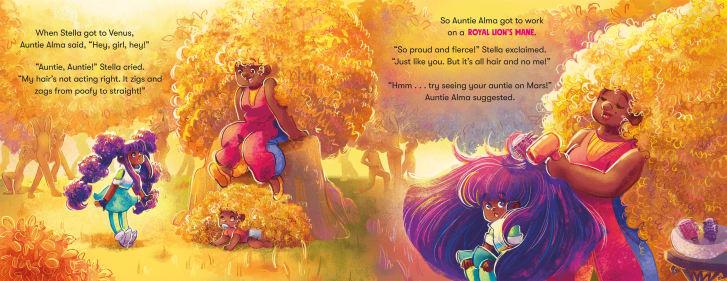
Stella is aided on her intergalatic quest by cosmic aunties, who each have a hairstyle for her. Credit: Yesenia Moises
The whole concept of having aunties from the different planets came from one Black hair trade show I attended, which was full of older Black women with amazing natural hairstyles that showed their personalities. And I'd never seen that before. I was so used to making sure that my hair was as flat as possible, but here were all these older women who were just proud of the hair that grew out of their scalp. It really inspired me to show just how versatile and beautiful Black hair can be.
I think it's really important for young readers to feel seen more than anything else. As a dark-skinned Afro Latina, it wasn't until 2018, when I saw Miles Morales become Spider-Man in "Spider-Man: Into the Spider-Verse," that I saw someone with my background represented in the media I watch. I really loved how the director made a choice to exclude English subtitles for the conversations Miles had with his mother. When you add subtitles, it makes the experience feel foreign; but in their household, it was natural -- just like it is in mine. That really floored me.
Margarita Engle
Margarita Engle is a poet and author whose works celebrate her Cuban heritage. Her book "Drum Dream Girl," illustrated by Rafael López, is inspired by the true story of a young Chinese Afro Cuban girl who became a drummer for Cuba's first all-female jazz band.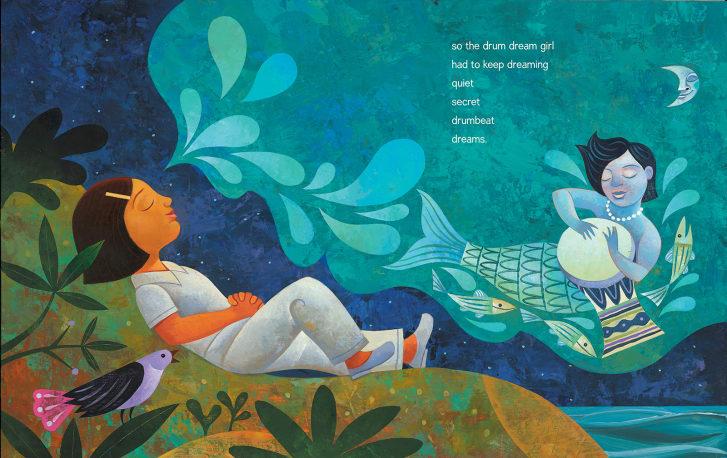
"Drum Dream Girl," written by Engle and illustrated by Rafael López, tells the journey of a girl in Cuba who pursues her love of drums. Credit: Margarita Engle/Clarion Books
I was born and raised in Los Angeles, but developed a deep attachment to Cuba, where my mother is from. We would go back in the summers to visit the extended family, but we were cut off from them because of travel restrictions after the missile crisis. When I was finally able to go back as an adult in 1991, I found that I wanted to write about the experience.
I know that, all of a sudden, we're not supposed to hyphenate things anymore in our writing. But I felt like I lived on that hyphen, and the compound word "Cuban-American." It was a bridge and an abyss at the same time; by the time I was a teenager, it felt like it was easier for a US citizen to walk on the moon than to visit relatives in Cuba.
Music is a recurring theme in my books. My picture book "Drum Dream Girl" is based on the life of Chinese Afro Cuban girl Millo Castro Zaldarriaga, who played the drums in Cuba when it was forbidden to girls.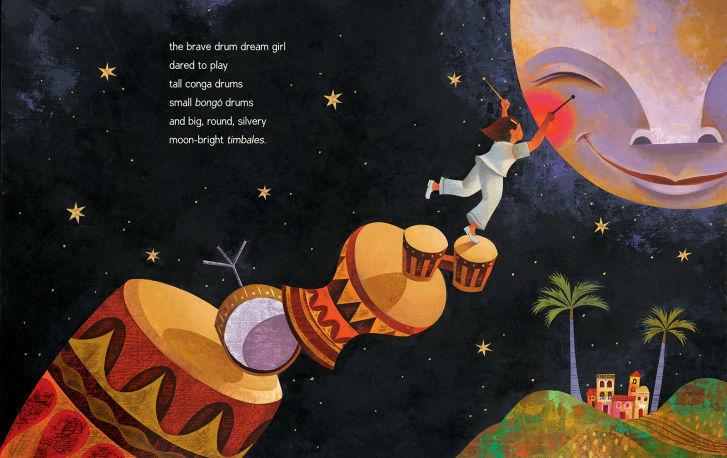
The story is a real tale of perserverence in a dreamlike setting. Credit: Margarita Engle/Clarion Books
I read the memoirs of her older sister and there were these amazing photographs of this all-girl band -- the first of its kind. In the 1930s, most of the jazz bands had been men, and here was one made up entirely of sisters. And the youngest was a 10-year-old girl who wanted to play the drums.
Even today, in certain cultural traditions that come from West African religion, women in Cuba have to fight for the right to play certain types of drums. But in Millo's case, for entertainment, she really opened that door. The band became very successful, and everybody loved her drumming, so, after a while, many other women drummers followed.
I was inspired by her courage and her perseverance. When I talk to children about that book, I ask the boys, 'How would you feel if society said you couldn't drive monster trucks, or only girls could motorcycle race?' And all the boys immediately give up their right to be the only one to do something. They instinctively understand that this isn't fair.
Charles Esperanza
Charles Esperanza is an Afro Puerto Rican illustrator and author whose new book, "Boogie Boogie Y'all," published this summer. The book is a brightly colored depiction of his home borough of the Bronx, as well as a tribute to graffiti.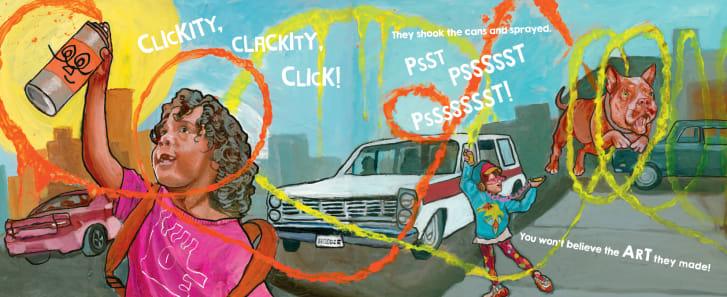
"Boogie Boogie, Y'all" celebrates the Bronx as a colorful cultural hub. Credit: CG Esperanza
I'm interested in telling stories and taking something about our culture -- as a Black and Latino person, and as a Bronx resident -- and de-stigmatizing it. What inspired "Boogie Boogie, Y'all" was an awesome graffiti piece outside of the community center where I teach. I took a photo of it to show to my students; it turns out none of them has seen it before. I said, "Y'all don't really look around and take in all of the awesome things that are on the street."
I've asked my students what they've heard about graffiti and a lot of the answers were recycled from decades ago: It's gang symbols; it's vandalism. I wanted to give them another perspective about it; I pay homage to a lot of contemporary street artists in the book like "Gully" and "Modus," who can be seen all over the Bronx and the rest of New York City. They've seen the book and have expressed excitement about it.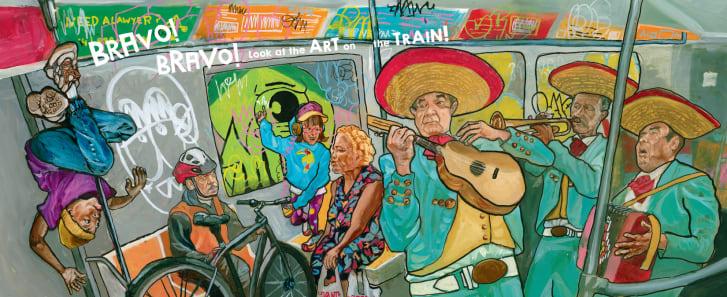
Esperanza wrote and illustrated the book after a conversation with his students about noticing what's in front of the them on the streets of their home borough. Credit: CG Esperanza
I think kids need to be able to see themselves in the books that they read, and they need to be able to see themselves in the art they look at. As a teacher, I notice many of my Black and Brown students create White characters. Instead of preaching to them that they should use people of color, I show them examples of amazing Black characters, created by artists like Yesenia Moises, LeSean Thomas or Geneva Bowers to inspire them.
I get a lot of inspiration just walking around the Bronx, and I definitely wanted to capture that. I love the borough for its grittiness and personality. We are known for our cultural contributions through hip-hop, but we have so much more in food, fashion, art and music that's waiting to be shared with the world. All of our communities -- old and new -- are adding their vibrant tag to the wall that is the Bronx.
When I was first trying to get into the business. I heard some really wild things about why publishers wouldn't have a Black child as the protagonist. I remember one editor told me that for picture books, they would rather have an animal like a panda or something as a main character, because every kid could relate to that. I was blown away, realizing that the underrepresentation was intentional this whole time. So I'm glad that we have so many artists now that are coming in and knocking down the door and doing awesome things.
Each author's personal statement was edited for length and clarity by a member of the CNN Style team.Jess Bergman/August 11, 2021
The Uncomfortable Rise of the Instagram Novel
Beth Morgan’s “A Touch of Jen” is the latest work to reckon with a social media–fueled obsession.
https://newrepublic.com/article/163238/uncomfortable-rise-instagram-novel-touch-jen-beth-morgan?utm_source=Sailthru&utm_medium=email&utm_campaign=Lit Hub Daily: August 13, 2021&utm_term=lithub_master_listA sudden price change for Amanda Gorman’s book shocked booksellers.
https://www.publishersweekly.com/pw/by-topic/industry-news/bookselling/article/87229-gorman-book-s-price-hike-startles-booksellers.htmlWriters notes: the record label remixing novels into music
https://www.theguardian.com/books/2021/aug/27/writers-notes-the-record-labels-remixing-novels-into-music-bibliotapesREFERRAL- New Environmental Canon, An LGBT+ Picture Book, and Women in Horror: This Week in Book News
https://kobowritinglife.com/2021/08/27/new-environmental-canon-an-lgbt-picture-book-and-women-in-horror-this-week-in-book-news/
-
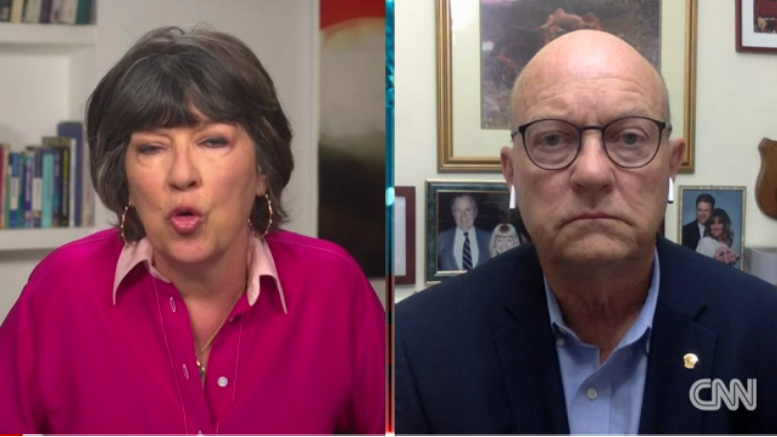
truth on the statian empire- I just love the fact that he is honest about the usa as an empire, I find so few, including Amanpour the interviewer seem unable to say the usa is an empire, like admitting it is a sin or some truth that if said destroys the peace in the world or something.
amanpour with lawrence wilkerson
https://edition.cnn.com/videos/tv/2021/09/10/amanpour-wilkerson-9-11.cnn NO TRanscript but I will try to remember
To Afghan women
“The Other Afghan Women” | Video | Amanpour & Company | PBS
Transcript
WELL, YOU KNOW, WHEN WE THINK ABOUT THE WAR IN AFGHANISTAN, WE TEND TO HAVE A VERY VAGUE IDEA OF IT, BUT IN FACT ON THE GROUND THE WAR IS ONLY FOUGHT IN PART OF THE COUNTRY AND THAT'S IN THE RURAL, SOUTHERN AFGHANISTAN, AND SO I WAS REALLY CURIOUS TO SEE WHAT WAS LIFE LIKE FOR PEOPLE WHO HAVE BEEN LIVING, IN SOME CASES THROUGH FOUR DECADES OF CONFLICT.
SO I DECIDED TO TRAVEL THIS SUMMER TO INTERVIEW DOZENS OF WOMEN TO TRY TO FIND OUT.
I'M JUST CURIOUS, HOW DID YOU FIND THESE WOMEN AND WERE THEY OPEN TO SPEAKING WITH YOU?
I KNOW YOU SPENT A SIGNIFICANT AMOUNT OF TIME WITH A WOMAN NAMED SHAKIRA, WHO SEEMS SURPRISED SHE SHARED HER NAME WITH ONE OF THE WORLD'S BIGGEST POP STARS.
MANY OF THESE WOMEN HAVE NOT MET FOREIGNERS.
SHAKIRA TOLD ME SHE HASN'T MET A FOREIGNER WHO WASN'T CARRYING A GUN.
SO THEIR ONLY EXPERIENCE WITH THE INTERNATIONAL COMMUNITY IS THROUGH VIOLENCE, THE MILITARY.
SO IT WAS DIFFICULT FOR ME TO ACTUALLY MEET THEM AT FIRST.
I HAD TO GO THROUGH GRANDMOTHERS BECAUSE IN THESE VERY CONSERVATIVE, TRADITIONAL AREAS IT'S VERY UNUSUAL FOR MEN, UNRELATED MEN TO SPEAK WITH WOMEN, UNRELATED TO THE TALIBAN.
IT'S BEEN THIS WAY FOR A LONG TIME.
SO I FIRST MET WITH SOME GRANDMOTHERS AND THEY REFERRED ME TO OTHER PEOPLE AND EVERY SINGLE TIME I MET SOMEBODY, I ASK THEM, TELL ME YOUR LIFE STORY FROM THE BEGINNING.
WHEN THEY DID THAT, I WAS REALLY SHOCKED, EVEN AS SOMEBODY MYSELF WHO HAS BEEN COVERING THIS CONFLICT FOR A DECADE, I WAS SHOCKED BY THE LEVEL OF VIOLENCE THEY HAD SEEN.
WHETHER IT'S AIR STRIKES OR ROADSIDE BOMBS OR KIDNAPPINGS OR WHAT NOT.
YES, BECAUSE SO MUCH OF WAR, ESPECIALLY FOR THOSE THAT DON'T LIVE THROUGH IT, THE TOLD THROUGH THE LENS OF THE GOOD GUYS AND BAD GUYS.
ONE WOULD ASSUME OBVIOUSLY THAT THE GOOD GUYS WOULD BE THE AMERICANS AND ALLIES THAT COME IN AND SUPPORT THE AFGHAN ARMY AND IT'S NOT AS SIMPLE OF THAT.
THIS IS REALLY WHAT GETS TO THE CRUX OF YOUR PIECE HERE.
I WANT TO JUST READ ONE VERSE FROM IT.
YOU WRITE THE TALIBAN TAKEOVER HAS RESTORED ORDER TO THE CONSERVATIVE COUNTRYSIDE, WHILE PLUNGING THE LIBERAL STREETS OF KABUL INTO FEAR AND HOPELESSNESS.
THIS BRINGS TO LIGHT THE UNSPOKEN PREMISE OF THE PAST TWO DECADES.
IF U.S. TROOPS KEEP BATTLING THE TALIBAN IN THE COUNTRYSIDE, THEN LIFE IN THE CITIES COULD BLOSSOM.
THIS MAY HAVE BEEN A SUSTAINABLE PROJECT, BUT WAS IT JUST?
CAN THE RIGHTS OF ONE COMMUNITY DEPEND IN ON THE RIGHTS OF ANOTHER?
IS IT REALLY AS BINARY OF A CHOICE AS THIS?
DO THESE WOMEN FEEL THEIR LIVES ARE BEING SACRIFICED FOR THE LIVES AND FREEDOMS OF WOMEN IN LARGER CITIES?
YOU KNOW, EVERY SINGLE WOMAN I MET I ASKED THEM ABOUT WOMEN'S RIGHTS.
I SAID, YOU KNOW, THE UNITED STATES SAYS THAT ONE OF THE REASONS WHY THEY'VE INVADED AFGHANISTAN AND THEY SUPPORT THE AFGHAN GOVERNMENT IS TO BRING RIGHTS TO WOMEN
-
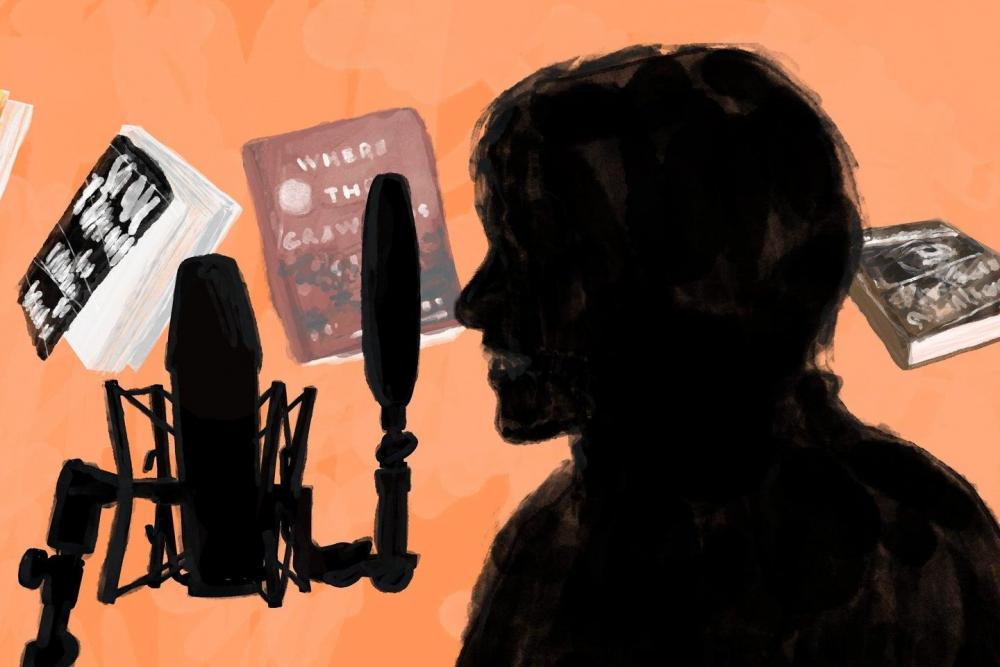
“I Probably Modeled Him on Something I’d Heard on The Wire”
The audiobook industry is collectively squirming through the cultural debate on representation and casting.
BY LAURA MILLER
Twenty years ago, Grover Gardner began narrating a series of comic mysteries whose title character is a white lawyer named Andy Carpenter. In the series—written by David Rosenfelt—Carpenter also has a partner, Willie Miller, who’s a Black ex-con, which means Gardner had to voice Miller too. Back then, he hardly gave any thought to the fact that he was a white narrator voicing a Black man. “I probably modeled him on something I’d heard on television, on Hill Street Blues, or The Wire,” Gardner said. Today, 14 books later, he’s still voicing Willie—but he’s changed his approach. “I’d think very hard about doing that kind of accent now,” he said.
In an era of heightened sensitivity to issues of representation and misrepresentation, it’s no longer acceptable to cast a white actor as a character of color in a movie or TV show. But audiobooks play by different rules. It’s customary now in the audiobook business to try to match a book’s narrator to the gender, race, and sometimes sexual orientation of a novel’s author or main character. Yet most novels feature characters with an assortment of different backgrounds, and this can require narrators to voice characters with identities very different from their own.
When audiobooks first rose to popularity in 1980s, the field was overwhelmingly white. Gardner, who has been an audiobook narrator for four decades and also works as a producer, recalls that, for the first couple of decades of his career, “the whole industry was geared toward middle-aged white businessmen” who listened to “books on tape” while on the road for work. There were hardly any narrators of color, and few female narrators back then, Gardner said. “I recorded Scott Turow’s [1990 novel] Burden of Proof. The narrator of that book is a Latino lawyer,” he told me. “I did it. We did whatever they sent us back then. But I wouldn’t do that book today. You would find a Latino narrator to do it.”
Apart from the amused response to the cartoonish accents Ronan Farrow rolled out when narrating the audio version of his 2019 exposé Catch and Kill, the audiobook world has so far been largely free of the sort of scandals that have triggered reckonings about representation in other creative industries, like magazine publishing and television. This is partly because it’s a low-profile, unglamorous field that doesn’t attract a lot of attention from the press. But many who work in the industry still feel the tensions around casting acutely. Amid a publishing boom in literature by writers of color, nonwhite narrators are being offered more work than they once were. Meanwhile, like most narrators, they find themselves getting asked to voice marginalized characters from backgrounds that bear no resemblance to theirs. January LaVoy, a biracial narrator who identifies as Black, said that cross-cultural audiobook narration is freighted in different ways for white narrators and narrators of color. “For many white narrators, it’s difficult because of fear [of backlash]. For many narrators of color, it’s difficult because of the weight of responsibility.” The industry is grappling with these issues daily. “It’s difficult for everyone,” LaVoy said.
Although some publishers have audiobook divisions, they usually function separately from the print division, and the audio rights for many titles get sold to separate companies such as Brilliance or Blackstone. The producer of an audiobook, who is employed by the publisher, acquires the rights and oversees casting and other big-picture decisions, such as opting for multiple narrators on a novel that often switches points of view.
Michele Cobb, a producer and the executive director of the Audio Publishers Association, told me that she and her colleagues have tried to figure out how they can sensitively ask narrators to provide producers with information about their backgrounds—such as gender identity, sexual orientation, and disability—that can be helpful when casting. Cobb explained that it’s an ongoing challenge to cast appropriate narrators for books by authors of color, while avoiding typecasting. In her own company, which publishes romance audiobooks, “I’ve definitely had authors come back and say, ‘Well, this character is white so I wouldn’t go with a Black narrator,’ ” a choice she feels obliged to respect.
Traditionally, both a director and an engineer, usually both freelancers, work on the recording with the narrator. Director Simone Barros outlined an exhausting list of tasks to me, from making sure the narrator doesn’t skip or add words to researching accurate regional pronunciations and maintaining continuity. “You can get to the last page of the book, and it will mention that a character had a German accent the whole time,” said Barros, speaks with the mile-a-minute lucidness of a person whose job is anticipating every contingency. Barros is of Cabo Verdean descent and identifies as Black.*
In the case of some first-person narrators, such as the one in Charlie Kaufman’s Antkind, an audiobook Barros directed, the book is “written so much within the perspective of the first person that the ethnicity of other characters are specifically heard from the narrator’s perspective of them. More specifically in Antkind, the author’s very point is this shifting, mutable and even unreliable perspective, to shine a light on how too often minority characters go unseen, or only seen or heard through a bias cipher.” But with a book written in the third person, she and her narrator will work up a full voice profile—a cache of recorded dialogue and biographical information—for each speaking character. That way, if, say, a villain appears in a novel’s first few pages only to disappear for several chapters, the narrator and director can remind themselves of what he sounds like. Such profiles are particularly helpful with recurring characters in sequels and series, which may be recorded years later.
In the past, it was largely left up to the professionals behind the scenes to anticipate and head off any problems. Ten years ago, it wasn’t uncommon for a book’s author—the person most intimately acquainted with a title—to have no input at all in the audiobook production. But as audiobooks became a more mainstream and high-profile format, authors began seeking more oversight. Today, writers often get the final say on casting, and are often invited to choose a narrator from a selection of sample recordings and encouraged to provide crucial information about how characters ought to sound. Nathan Harris, a Black writer whose debut novel, The Sweetness of Water, is set at the end of the Civil War, knew the accents of his multiracial cast of characters, who include freed slaves, would be a challenge. “You can go down a very precarious road with how they sound,” he said. “That’s why I didn’t want to do it myself.” His publisher presented him with an audition recording by William DeMeritt. “They told me they could go in all sorts of different directions if that’s what I wanted,” Harris said. “But he just nailed it.”
Over the past few years, the crew of professionals who work on a given book has increasingly been whittled down to a bare minimum, putting greater pressure on narrators’ judgment—even though a narrator, who is in most cases a freelance contractor, doesn’t have much time to carefully screen a book for potential stumbling blocks before agreeing to the job. The exploding demand for audiobooks with the advent of digital downloads and, most recently, an increasing number of home studios built during the pandemic also means that more narrators have ended up doing most of the production work and key decision-making on their own.
Some narrators say they now turn down jobs when they feel unsure about voicing major characters. Cassandra Campbell—narrator of, among other things, Delia Owens’ bestseller Where the Crawdads Sing, a novel featuring several Black supporting characters—recalled narrating the first two in a series of books, which made her the automatic choice for the third. But when she discovered that the third book was told from the point of view of a young Burmese boy, Campbell, who is white, bowed out. “I just didn’t feel comfortable with it,” she said.
A multitude of minor characters can turn an audio book into a minefield for its narrator. Edoardo Ballerini, who was profiled in the New York Times Magazine last year as “a go-to voice for intelligent, subtle but gripping narrations of books,” says he’s now most often asked to narrate books requiring European accents. (His father is an Italian poet, and he was raised in New York.) Still, challenges do arise. “Take a James Patterson book,” he explained. “Let’s say it’s set in New York City and the detective is hard-boiled, an Italian-American. I can do that. His partner is a feisty woman and I think I can handle that.” But then the minor characters start showing up, sometimes slotted into uncomfortably stereotypical roles: “They get in a cab and there’s the cabbie, or they run into a perp who happens to be Black, or whatever it is. You have to voice them as well. And there’s really no way for anyone to say, ‘Well, I’m not going to do this book because there are a handful of lines by an Indian cabbie.’ ”
Meanwhile, many narrators of color—extra-conscious of the weight of representation—find themselves engaging in a lot of extra, unpaid work researching characters and voices that they may ultimately decide they can’t do justice to. Recently, LaVoy bowed out on a title in a children’s series she narrates about a group of middle school students who travel the world with their eccentric professor, encountering mythical creatures from the cultures they visit. “When we did one that took place in the Pacific Northwest,” she said, “we got a Native American linguist from the Muckleshoot tribe to work with me. I felt really comfortable,” she said. “But this one particular book took place in Cuba, and it was very heavily written in Spanish,” a language LaVoy doesn’t speak fluently. When she got to a part where the whole group begins singing the Cuban national anthem, she decided to pass. “They needed someone with a different mouth,” she concluded.
A character’s accent can be an evocation of her origins and identity, but it can also be—as was the case with Apu, the Indian-born convenience-store clerk on The Simpsons, voiced by white actor Hank Azaria—a mocking caricature. (Azaria recently announced that he would no longer voice Apu and expressed a desire to “go to every single Indian person in this country and personally apologize.”) “Actors love to do accents!” Campbell told me. “It’s fun to do vocal gymnastics, but we have had a moment of recognizing that there are certain accents where you’re appropriating someone’s culture.”
The one motto that nearly every audiobook professional I interviewed repeated to me when I asked about their strategies for dealing with accents is “less is more.” Kevin R. Free—a Black theater actor who began narrating audiobooks 20 years ago and has become the voice of both a soap opera–addicted cyborg in Martha Wells’ Murderbot series and of Eric Carle’s iconic picture books (The Very Hungry Caterpillar, etc.)—laughingly recalled reporting for his very first recording session armed with a set of theatrically bold character voices, only to be told by his director: “I don’t want you to think of doing this book as doing a solo show. … There’s no reason for you to go all the way there.”* That holds especially true for cross-cultural accents. If Ballerini feels that “maybe I’m not the right person to give a voice to this particular character, let me just do it as plainly and as simply as I can. I think that’s a general trend that’s happening in the industry.”
Campbell explained that when voicing characters of color, she uses an acting technique that focuses on the character’s intentions rather than on more superficial markers of identity like accent. “What does the character want from the other person in the scene? What is the conflict of the scene? Play that fully without relying on cultural stereotypes.” In Campbell’s recording of Where the Crawdads Sing, she audibly dials the rural North Carolina accents of the Black characters further down than the accents of the white characters they interact with.
Sometimes, however, an accent shouldn’t be underplayed, because it serves a crucial role in the story. That can create conflict with the production or postproduction staff, if they’re not familiar with or sensitive to the cultural context of a book. Barros directed the audiobook of Simon Han’s 2020 novel Nights When Nothing Happened, about a family of Chinese immigrants living in Texas. The wife in the book becomes annoyed when her husband leaves an outgoing message on their answering machine pronouncing the family’s surname as “Chang,” as the Texans around them say it, rather than using the Mandarin pronunciation, which is closer to “Cheng.” When narrator James Chen’s recording went through a postproduction process called quality control, or QC, Barros and Chen received orders for “pickups” (short rerecordings edited into the final audiobook to correct errors) on every instance of the family’s name, instructing them to pronounce it the Anglicized way—as the Texans do. This was, as Barros put it, “not only totally wrong,” but a literal replication of the assimilation that so bothers the main character’s wife. In that instance, the producer backed Barros and her narrator, but that’s not always the case; January LaVoy wincingly recalled the time that, at a director’s insistence, she recorded pickups replacing her correct pronunciation of Latinx with latinks.
Deciding whether to use the Anglicized or loanword pronunciations can be fraught for bilingual performers. Emily Woo Zeller, a Chinese American narrator, has sometimes clashed with directors and QC over whether to Anglicize the pronunciation of words taken from other languages, such as tofu or kung fu. She is also one of the few narrators I spoke with who took the step of contacting the author of a book that she found objectionable. “I won’t name names,” she told me, “but it was a white author,” and the scene involved what Zeller called “misplaced comedy,” in which the author “mixed up Chinese and Japanese culture, and the comedy was about the way characters looked and the fact that wanted to do kung fu and they were Communists.” Deciding “this can’t come out of my mouth,” Zeller brought her concerns to the author, who, she said, was “very apologetic and willing to change it.”
Hers was an unusual move. Audiobook narrators tend to see their role as strictly interpretative. Their job is to convey the book from the author to the reader in a way that remains true to the author’s intent. This includes texts like classics, books whose authors can’t be appealed to for changes, and books that contain words, passages, and characters that are now deemed offensive. There also remain plenty of contemporary authors who, as Cobb tactfully put it, “haven’t caught up yet,” and narrators will continue to have to figure out how to perform those books.
For Grover Gardner, four decades in the audiobook industry have taught him that “where there’s ignorance, you fall back on the only things that you’ve seen or heard, and chances are very good that, if you’re an older person, you’re drawing on a stereotype.” He’s had to work to transform some of his ongoing roles from vocal clichés into full characters. In the case of the former convict Willie in the Andy Carpenter mysteries, for instance, he has consciously tried to lean less on an exaggerated accent as an actorly crutch. “I’ve tried to focus more on attitude,” Gardner said, “on the real person.”Correction, June 23, 2021: This article originally misstated that Simone Barros is Black. Barros is of Cabo Verdean descent and identifies as Black.
Update, June 23, 2021: This article has been updated to add additional comments by Barros about the narration and perspective in Antkind.
Correction, June 22, 2021: This article originally misstated that Kevin R. Free began narrating audiobooks five years ago. Free began narrating audiobooks 20 years ago.
How Stories Change When They Move From Page to Voice
Laura Lindstedt on the Different Ways We Read a Book
By Laura Lindstedt, translated by David Hackston
June 14, 2021To all intents and purposes, a psychoanalyst’s couch is in fact a bed—after all, it lacks a back and armrests. And yet, this item of furniture must be called a couch. Nobody would offload their traumas on a psychoanalyst’s bed unless, that is, they were in a relationship with said psychoanalyst.
In October 2019, I found myself sitting in the Silencio recording studios, headphones over my ears, reading aloud my novel My Friend Natalia, which had been published in Finland six months earlier.
“‘Natalia’ was one of my first clients to lie on her back without prompting,” I read and continued: “When I showed her round my office, which I had rented in an apartment next to my house, I told her about the couch.”
These two consecutive sentences are from the opening chapter of the novel. Reading these sentences aloud irrevocably sprained something in my brain.When one reads a book aloud as an audiobook, the visual aspects of the text all disappear. Of course, one could read the word couch, which appears in italics, in a slightly different way, perhaps by holding a short, artistic pause before the word. But this is not the same thing. Italics are not the same as a short pause.
The therapist, the book’s narrator, gives the patient the code-name “Natalia.” Under the cover of this anonymity, the therapist then proceeds to divulge intimate details of Natalia’s life to the reader, then at one point removes the inverted commas from Natalia’s name “as I might remove the safety catch from a gun”. When read aloud, this sentence is absurd: the listener cannot hear the inverted commas around Natalia’s name.
*
Let’s be clear: I am very skeptical about the practice of turning works of literature into audio recordings.
If audiobooks become the primary way in which we interact with books, it would be strange if at some point this did not have a direct impact on how people write literary works.
Will writers—either consciously or subconsciously—start writing books so that they sound good when read aloud? The succinct speech between Me (the writer) and You (the reader) works well when spoken aloud, so the current appetite for autofiction is unlikely to dwindle any time soon. A linear narrative, in which we already know (or think we know) something about the end point, is also easy to listen to. For this reason, celebrity autobiographies and so-called true stories make for successful audiobooks.
However, complex narrative structures, shifting perspectives, narrative polyphony, long, meandering sentences and the visual aspects of a text find themselves increasingly under threat from a medium that relies solely on hearing. If linear narrative becomes the only acceptable form of complex literary expression, our thoughts will be the poorer for it. Imaginary worlds and possibilities will shrink because such worlds and possibilities are not “content” that can be detached from “form,” they are not statements, suggestions or questions isolated from their rhetorical devices.*
That being said, I’m not a militant opponent of audiobooks. To my mind, it is simply important to recognize that there is a significant difference between the printed book and the audiobook. Written material turns into vibration, letters become sound waves. They always come from a concrete source that guides our interpretation, a source that is completely different from the reading process heard through our “inner voice.”
A new element appears between the book and its recipient: a voice that shapes how we receive the text. It is a sound born of a human body in a unique way and that is (generally) readily identifiable as the voice of a man or a woman.
In the audiobook of My Friend Natalia, this unavoidable fact becomes a poetic problem in its own right. Throughout the text, I have scattered conflicting clues as to the sex of the therapist, the novel’s first-person narrator, but I was careful never to define the therapist as either a man or a woman. With certain exceptions, in many languages a writer and a translator can easily disguise or at least avoid the matter of the narrator’s sex. A writer can also play with this ambiguity, as is the case in my novel My Friend Natalia.
Some readers have been convinced that the narrator is a man, others have considered the therapist a woman. Several readers have told me that their perception of the matter changed as they were reading. Readers always read a text through the prism of their own experiences, preconceptions and cultural stereotypes.
For this reason, I wanted to read the Finnish audiobook of My Friend Natalia myself. I am a woman, but because I am the book’s author my voice is above all an authorial voice, and in this way I feel I managed to resolve the dilemma described above.But my relief was somewhat premature. I was once again forced to confront this matter in early 2021 when Penguin Random House Audio began to produce the English-language audiobook of David Hackston’s translation of My Friend Natalia (W.W. Norton/Liveright).
PHR Audio’s producer kindly sent me a number of audio samples to listen to. All these samples were very professional and of the highest quality, but still they were unsuitable for my novel’s narrator. I started to lose hope. Was it at all possible to find an actor whose voice was neither that of a man nor a woman, a voice that wasn’t too young as it should be a voice that conveys the therapist’s wealth of professional experience? The voice also needed dash of pompous embitterment, stemming from the fact that nobody seems to value the therapist’s subtle genius.
But we were lucky, and eventually we found an excellent voice, that of the actor TL Thompson, who identifies as non-binary and whom I chose as the English-language reader for My Friend Natalia.
Thompson’s voice is characterful, mesmerizing and unforced. To my own ear, Thompson’s voice sounds more masculine than feminine, or perhaps it’s the whisky baritone of an elderly lady. However, the voice is not remotely “gender-neutral,” a voice-type that we tried to look for at first and whose very existence I have seriously begun to doubt. Thompson’s voice made every sentence oscillate between the two. I have not written such oscillation into my novel, let alone a gender-neutral narrator’s voice: the question of the therapist’s identity opens up—if, indeed, it opens up at all—when readers find themselves indulging in assumptions that the text does not affirm.
I can say quite whole-heartedly that I love Thompson’s reading. Yet in the same breath, I must reiterate what I have already said: an audiobook is a different entity from a printed book.
*
For me, the act of interpretation is specifically that of thinking with the book. It requires stops, pauses, flicking through the pages, making notes in the margins. The book takes on markings, layers that are missing from digital products, which are perpetually new.
We can browse with our eyes but not with our ears, as my partner, who works with sound, would put it. The ear is more sensitive to chaos and clamor than the eye. Sound operates like a one-directional timeline, a surge that is hard to control. A detailed auditive perception of a large space is simply impossible.It is to these very layers that I return when trying to form an understanding of the kind of book I am reading. I can easily locate markings I have made by flicking through a book, even if it is a book I read 20 years ago.
The various temporal strata of my home library provide a shadow story of what has touched me and who I have been throughout my reading life. Last summer I awoke to the immeasurable value of these little scribblings when going through my grandmother’s estate after she died at the age of 100. From the collection of religious books, treatises and notebooks, I saved those in which my grandmother had left some kind of mark—and exclamation mark, a line under a section of text, or a Biblical verse in the margin. These markings reveal not only what touched her and who she was; they also say a lot about where I have come from, what kind of supra-generational reality I carry with me.
New works from Dr. Martin Luther King Jr.’s archives will finally be published, starting next year.
By Dan Sheehan
June 23, 2021, 11:21amThe publishing giant HarperCollins has reached an agreement with the estate of Dr. Martin Luther King Jr. to acquire world publishing rights to the late Civil Rights leader’s entire archives—a collection which contains some of the “most historically important and vital literature in American history.”
As reported by Publishers Weekly earlier today< read below > , the mega-deal gives HarperCollins world rights “to publish new books from the archives across all formats, including children’s books, e-books, audiobooks, journals, and graphic novels in all languages.”
Given the significance of the books in question, it seems strange that a deal like this one wasn’t made sooner, but this is welcome news nonetheless.
More welcome still is HC’s assertion that it will hire a dedicated archivist to oversee the project, and “engage prominent Black scholars, actors, artists, performers, and social activists to help bring Dr. King’s works to life.”
Way back in 1958, HC’s predecessor company Harper & Brothers published Dr. King’s very first book, Stride Toward Freedom: The Montgomery Story, which detailed the 1955–56 Montgomery bus boycott and described the conditions of African Americans living in Alabama during the era.
The first MLK titles to be published by HC are scheduled to drop in January 2022, to coincide with Martin Luther King Jr. Day.

HC Inks Deal with MLK Jr. Archives
By Rachel Deahl | Jun 23, 2021In an agreement with the estate of Dr. Martin Luther King, Jr., HarperCollins has acquired world publishing rights to the archives of the civil rights leader. The publisher said the collection features some of the "most historically important and vital literature in American history."
Judith Curr, president and publisher of HarperOne Group, negotiated the deal with Amy Berkower, president, Writers House and agent for the King estate; and Eric D. Tidwell of Intellectual Properties Management, manager of the King estate. The deal gives HC world rights to publish new books from the archives across all formats, including children’s books, e-books, audiobooks, journals, and graphic novels in all languages.
HC said it plans to hire an archivist who will oversee the material in the archive and make it "available to all HarperCollins editors globally." HC added that it intends to "engage prominent Black scholars, actors, artists, performers, and social activists to help bring Dr. King’s works to life."HC also has history with King. A predecessor company to HC, Harper & Brothers, published King's first book, Stride Toward Freedom: The Montgomery Story, in 1958.
All current his King titles, including those published by Beacon Press, will continue to be publishing by their current rights holders.
“We are thrilled to be the official publisher of Dr. Martin Luther King Jr.’s archives,” said Curr in a statement. “We view this as a unique global publishing program."
The first King titles to be published by HC are scheduled to drop in January 2022, coinciding with Martin Luther King Jr. Day.
SOURCE ARTICLE
Kobo Emerging Writer Prize, Books for Palestine, and an Intro to Booktok: This Week in Book News
https://kobowritinglife.com/2021/06/25/kobo-emerging-writer-prize-books-for-palestine-and-an-intro-to-booktok-this-week-in-book-news/
-


Following Naver's $600 million acquisition of Wattpad earlier this year, Wattpad and Naver's Webtoon are merging their film and television production studios under the name Wattpad Webtoon Studios. Aron Levitz, who previously oversaw Wattpad Studios, will serve as president of combined group.
"One of the best things about Wattpad Webtoon Studios is that we’re format agnostic, we have incredible IP with built-in fans in every genre, and stories that already travel across borders," said Ashleigh Gardner, deputy general manager for publishing of Wattpad Webtoon Studios. "We have access to some of the biggest libraries of stories and digital comics on the planet, with stories in every genre you can imagine."
Naver is supporting the new studio with an investment of $100 million in content development and production financing. The studio will use data to determine the most popular stories and attempt to ascertain their potential for success in the broader marketplace as TV shows, films or books.
"This commitment reflects Naver’s confidence in our team’s ability to create incredible books and industry-leading entertainment that fans will love in any format," Gardner said, adding that the formation of the studio and investment will enable Wattpad to move faster, to adapt stories for new formats and audiences.
-

OverDrive to Acquire Kanopy
June 9, 2021
2021, PRESS RELEASES
OverDrive Library and College Partners to Benefit from Kanopy’s Acclaimed Video Catalog, Platform and Apps
CLEVELAND – June 9, 2021 – OverDrive, the leading digital reading platform for libraries and schools worldwide, announced today that it is acquiring Kanopy, a leading video streaming service for public and academic libraries.
OverDrive to Acquire Kanopy - OverDrive
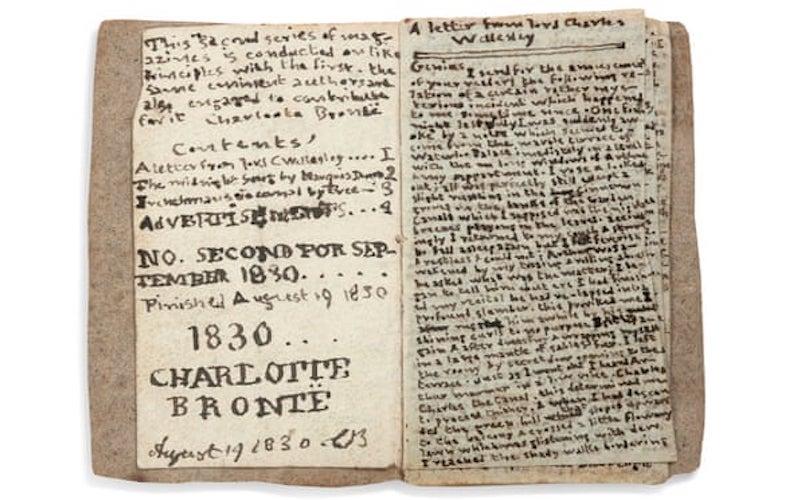
Brontë enthusiasts have banded together to stop Sotheby’s from auctioning off rare manuscripts.
By Walker Caplan
June 22, 2021, 1:37pm
Last month, Sotheby’s announced that a collection of rare Brontë-affiliated manuscripts, most notably a volume of 31 handwritten poems by Emily Brontë, was slated for auction along with other manuscripts by Robert Burns and Walter Scott. Now, Sotheby’s has agreed to delay their auction, as a group of British libraries and museums have announced their attempt to purchase and preserve the collection for the public. The time frame of the auction delay has not been publicly announced.
The aforementioned manuscripts are all part of a private library, the Honresfield Library, collected and kept in the 1800s by Alfred and William Law; after Alfred’s nephew, inheritor of the library, died, the collection disappeared from public view and was thought to be lost to the ages.
-

BEFORE YOU READ THE ARTICLE BELOW, I have a question
Where are the publishers for thoughts from non white communities in the usa, that are negatively biased toward others?
THE GREAT RIGHT-WING PUBLISHING DIVIDE WIDENS
Mike Pence and Jared Kushner are writing for establishment players, as Mark Meadows and Peter Navarro head to a conservative upstart. So where does Donald Trump end up?
BY CALEB ECARMA
JUNE 17, 2021
Right-wing authors struggling to ink book deals—like Missouri senator Josh Hawley, whose deal with Simon & Schuster was nixed after he seemingly cheered on the January Capitol riot—can take heart: A pair of conservative publishing executives have united to bring them hope. Louise Burke, a former top publisher at Simon & Schuster, and Kate Hartson, the former editorial director at Hachette Book Group’s Center Street imprint, are launching All Seasons Press, a company that, by its own definition, is “open to welcoming those authors who are being attacked, bullied, banned from social media, and, in some cases, outright rejected by politically correct publishers.”
Uproar over right-wing figures’ publishing deals has come to a head of late. In April, about 14% of Simon & Schuster employees signed a petition calling for Mike Pence’s book deal to be dropped, saying that publishing the former vice president amounted to “legitimizing bigotry.” (Simon & Schuster CEO Jonathan Karp ultimately ignored the petition request, writing in a letter to staff: “We come to work each day to publish, not cancel, which is the most extreme decision a publisher can make.”) Burke told the Wall Street Journal that she is “increasingly concerned and somewhat outraged about what’s going on in terms of free speech and free press” and fears the “canceling of voices that…are meeting resistance from mainstream publishers, particularly former [Donald] Trump administration members.”
While Burke noted that there is already “competition” in the conservative publishing industry, which includes Regnery and Random House’s Crown Forum imprint, she still believes there’s “room for another publisher, especially one that will be as independent as we are.”
Already, All Seasons Press has illuminated an interesting dividing line in terms of the Trumpers it plans to publish. There are those like former Trump chief of staff Mark Meadows, former White House adviser Peter Navarro, and ex-Rush Limbaugh producer James Golden who have migrated to the publisher, according to the Journal. (Hawley, for his part, found an alternative publisher in Regnery.) In an email to the outlet, Navarro claimed the publishing world has “devolved into a Cancel Culture, Virtue Signaling cesspool,” adding, “it is refreshing to see a new publishing house emerge willing to print books such as my forthcoming volume in the Fall that will speak truth to power.” Then there are those like Pence and Jared Kushner, whose deal with Broadside Books, an imprint of HarperCollins, was announced this week—the names so recognizable that publishers have seemingly calculated that the headache of printing their work is, financially speaking, worth the hassle of potential blowback.
Still up in the air is Donald Trump himself. The former president claims he is “writing like crazy,” working on a memoir of his time in office. He also claims he’s rejected offers from two unnamed major publishing houses. But sources at Penguin Random House, Hachette Book Group, HarperCollins, Macmillan Publishers, and Simon & Schuster—the Big Five publishers—recently told Politico they were unaware of any such offers. The outlet also reported that publishing executives are concerned that signing a deal with Trump could result in a staff uprising and other signed authors walking out in protest.
Books about Trump and his presidency, however, are still in demand. Michael Wolff’s Landslide: The Final Days of the Trump Presidency will be released on July 27, and Wolff said on Twitter that an excerpt of the book will appear in a New York magazine cover story on July 5. The book’s publisher, Henry Holt and Company, described it thusly: “In Landslide, Wolff closes the story of Trump’s four years in office and his tumultuous last months at the helm of the country, based on Wolff’s extraordinary access to White House aides and to the former president himself.”
The Great Right-Wing Publishing Divide Widens | Vanity Fair
-
-
My submission for the Sylessae draw in your style invitational on deviantart https://www.deviantart.com/hddeviant/art/Sylessae-Draw-THis-In-Your-Style-884297630
My version of Sylessae in my calligraphic art style

HEre is the poem I title: Sylessae
Moon
Terran Companion
Turning the solar gaze into embrace
Luna
L'etudiant de la vie d'existence
Toujours, silencieuse aux secrets
There is a fae, some name Sylessae
born when the moon form, the Earth's her dorm
Four verse to say, hope she wel and fray
... Frog rtrip over, mushroom, plash plus slime
Throat too gulp, sound like, a great big loom
Frog trip over, mushroom, plash plus slime
Hop to flee, tarsals, felt all boom
The Shadow from Sylessae
tell no lies
hear Bacchae
She kill in her month name may
The Shadow from Sylessae
say again
hear Bacchae
she kill in her month name may
If you want to read more of my poetry , please utilize the following https://www.kobo.com/ebook/poetry-or-more-1 -
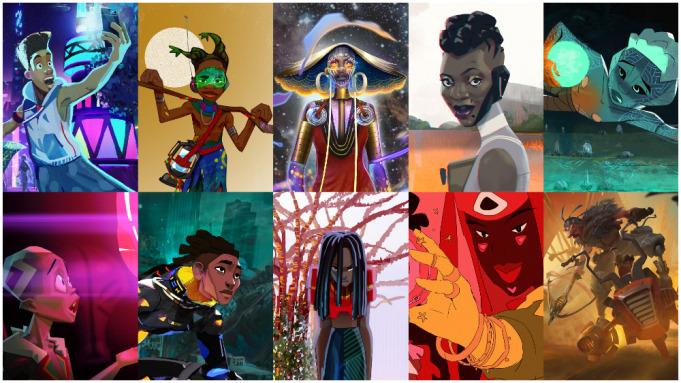
Disney Taps Top African Toon Talents for Animated Anthology ‘Kizazi Moto’
Disney has tapped top toon talents from across the African continent for “Kizazi Moto: Generation Fire,” a Disney Plus Original anthology of animated films set to premiere on the Mouse House’s streaming platform in late 2022.
Inspired by the continent’s diverse histories and cultures, the 10-part anthology brings together a slate of rising animation talents from six African nations to produce action-packed sci-fi and fantasy stories that will present bold visions of advanced technology, aliens, spirits and monsters imagined from uniquely African perspectives.
Oscar-winning director Peter Ramsey (“Spider-Man: Into the Spider-Verse”) will serve as executive producer, with Tendayi Nyeke and Anthony Silverston as supervising producers. Cape Town-based animation house Triggerfish, which received the prestigious MIFA Animation Industry Award in Annecy this year, will be the lead studio for the anthology, working in collaboration with animation studios across the continent and globally.
“We are bringing the work of a visionary new generation of African filmmakers to Disney Plus,” said Disney Plus and ESPN Plus president Michael Paull. “In addition to delivering thrilling animation for fans of all ages, this collection of ten original films taps into the Afrofuturism phenomenon which was turbo-charged by Marvel’s ‘Black Panther’ and reflects Disney’s ongoing commitment to partnering with leading global talent to tell the stories of the world from fresh and authentic points of view.”
“I’m really pleased to be part of a ground-breaking, fresh and exciting project that’s aimed at exposing the world to a whole new wave of creativity and invention from a place that is just ready to explode onto the world animation scene,” said Ramsey. “The films in the anthology kind of run the gamut when it comes to science fiction. There are stories that touch on other worlds, time travel, and alien beings, but all of these genre conventions are seen through an African lens that makes them totally new. I can’t wait for people to have their minds blown and say, ‘I want more!’”
More than 70 leading directors and creators across the continent were invited to pitch their ideas, after a multi-year research phase that included input from Ghanaian comic book blogger Kadi Tay, award-winning Congolese animation supervisor Sidney Kimbo-Kintombo (“Avengers: Endgame”) and Namibian-South African producer Bridget Pickering (“Hotel Rwanda”).
The process was curated and produced by the team at Triggerfish, including supervising producer Tendayi Nyeke, head of development Anthony Silverston, and Kevin Kriedemann, who proposed the initial idea for the anthology.
15 shortlisted projects were mentored by Ramsey and the creative teams from Triggerfish and Disney. The final 10 films are from Ahmed Teilab (Egypt), Simangaliso “Panda” Sibaya and Malcolm Wope (South Africa), Terence Maluleke and Isaac Mogajane (South Africa), Ng’endo Mukii (Kenya), Shofela Coker (Nigeria), Nthato Mokgata and Terence Neale (South Africa), Pious Nyenyewa and Tafadzwa Hove (Zimbabwe), Tshepo Moche (South Africa), Raymond Malinga (Uganda) and Lesego Vorster (South Africa).
Each film will be roughly 10 minutes long, and together will comprise a feature-length anthology of original animation that will be released as a Disney Plus Original across the globe.
“‘Kizazi Moto’ derives from the Swahili phrase ‘kizazi cha moto,’ which literally translates as ‘fire generation,’ capturing the passion, innovation and excitement this new cohort of African filmmakers is ready to bring to the world,” said Nyeke. “‘Moto’ also means fire in several other African languages, from Rwanda’s Kinyarwanda to Shona, a Zimbabwean language, speaking to the pan-African spirit we hope this anthology embodies.”
The announcement comes on the heels of a presentation on Wednesday by Walt Disney Animation Studios’ chief creative officer Jennifer Lee, pan-African entertainment company Kugali filmmakers Ziki Nelson, Hamid Ibrahim, and Tolu Olowofoyeku, WDAS VFX supervisor Marlon West and head of story Natalie Nourigat, who presented a sneak peek during the Annecy Animation Festival of their groundbreaking collaboration, the futuristic animated series “Iwájú,” which is slated for a 2022 release on Disney Plus.
ARTICLE URL
< https://variety.com/2021/film/global/disney-plus-kizazi-moto-annecy-1234998580/ >

